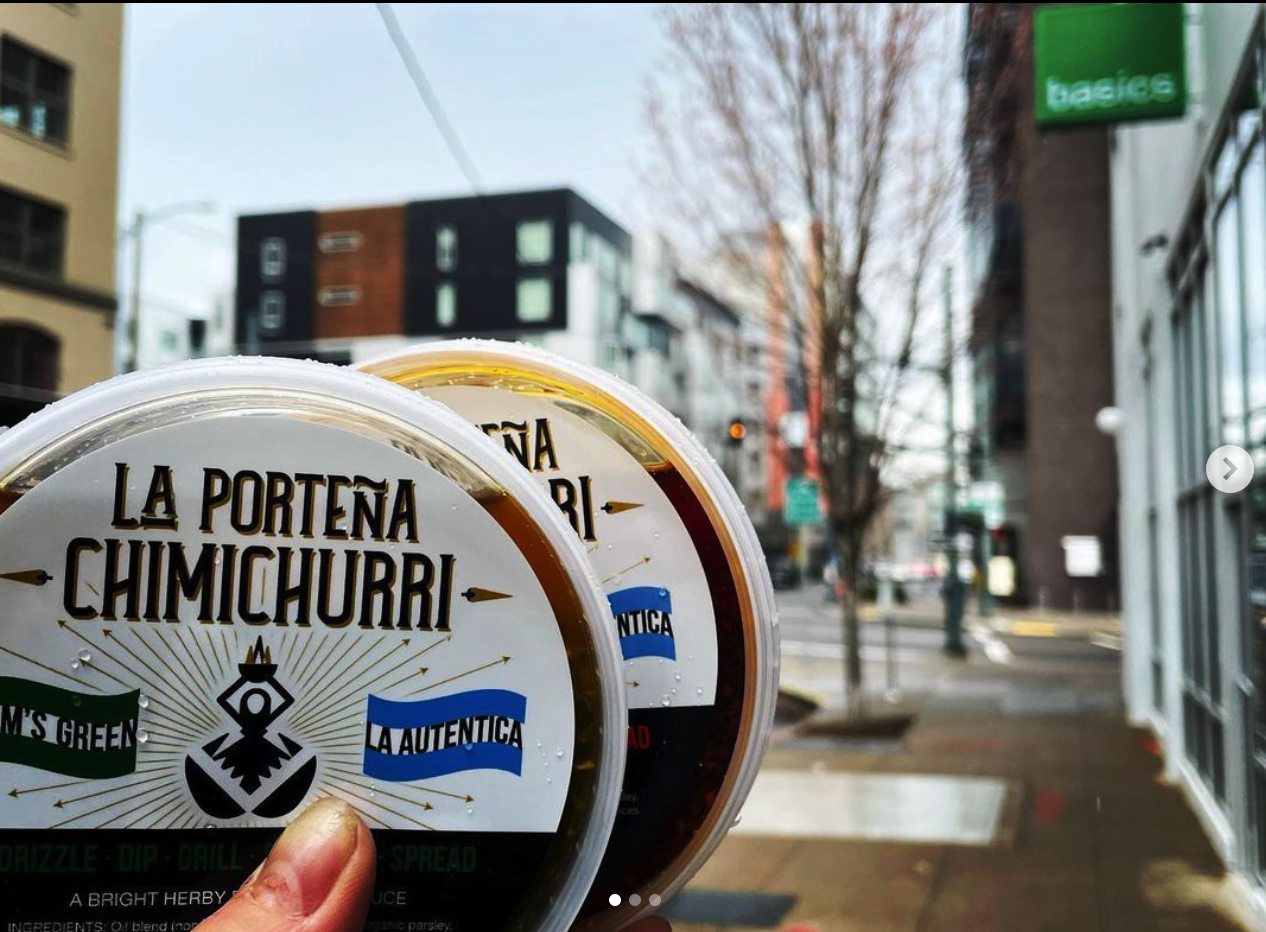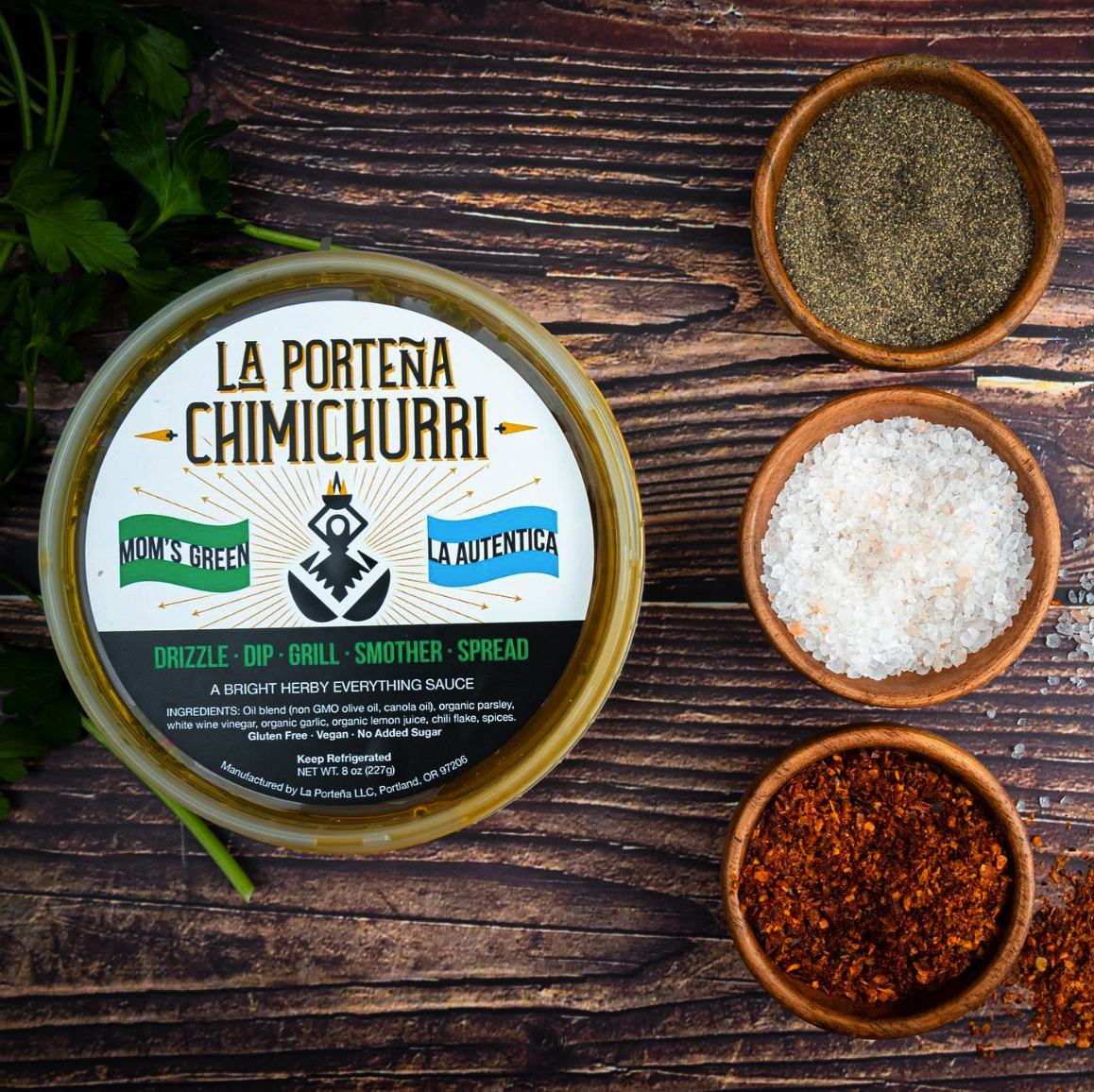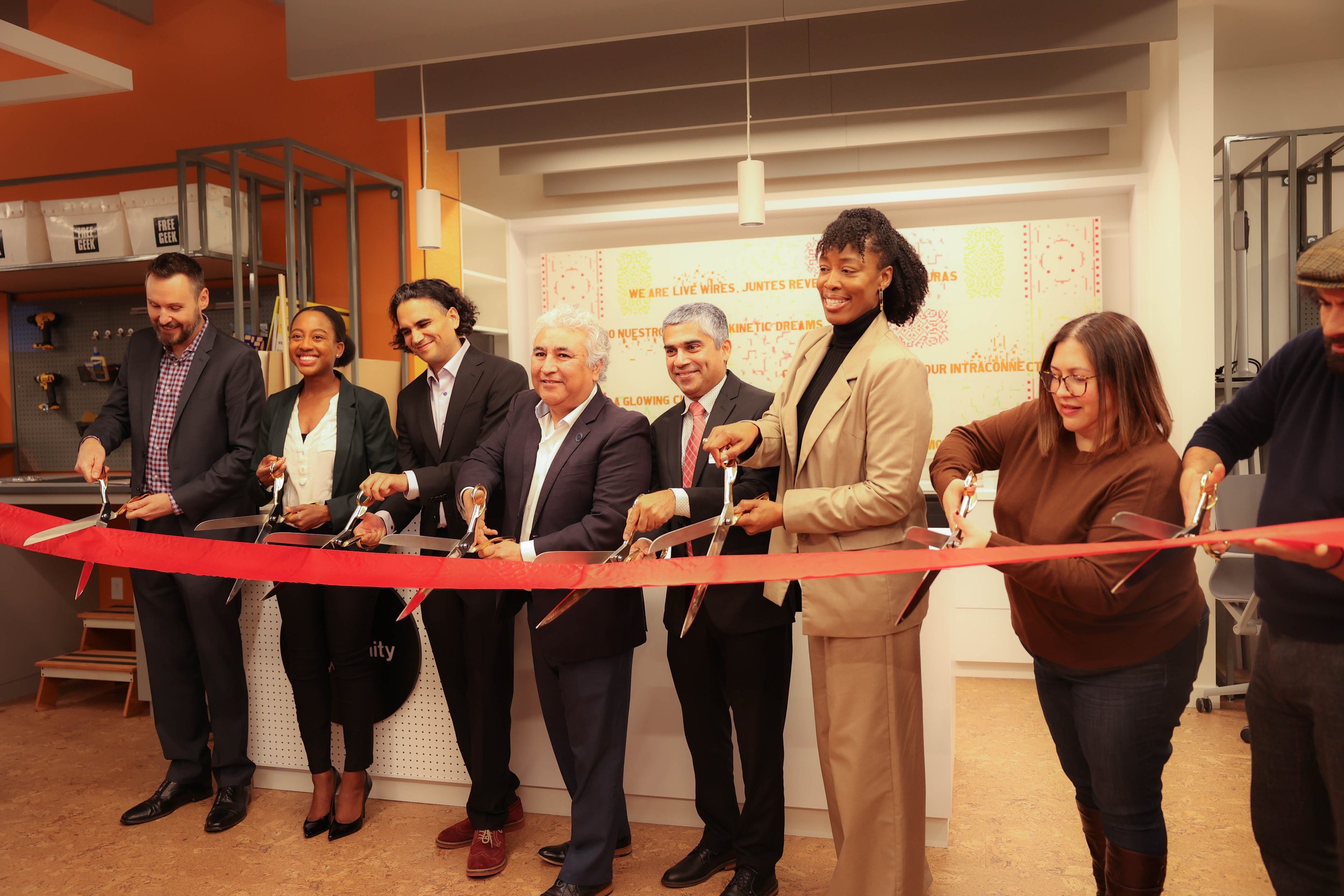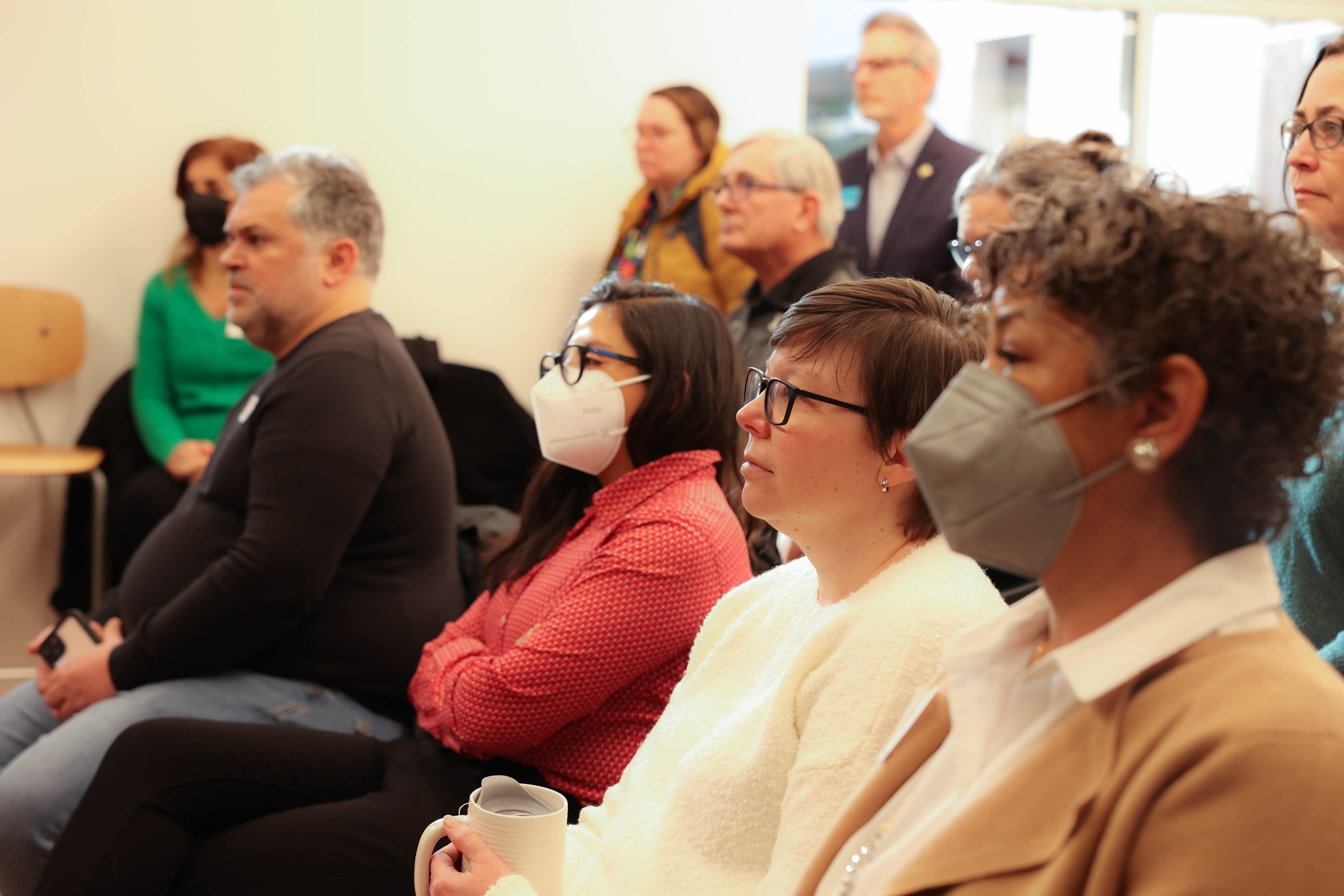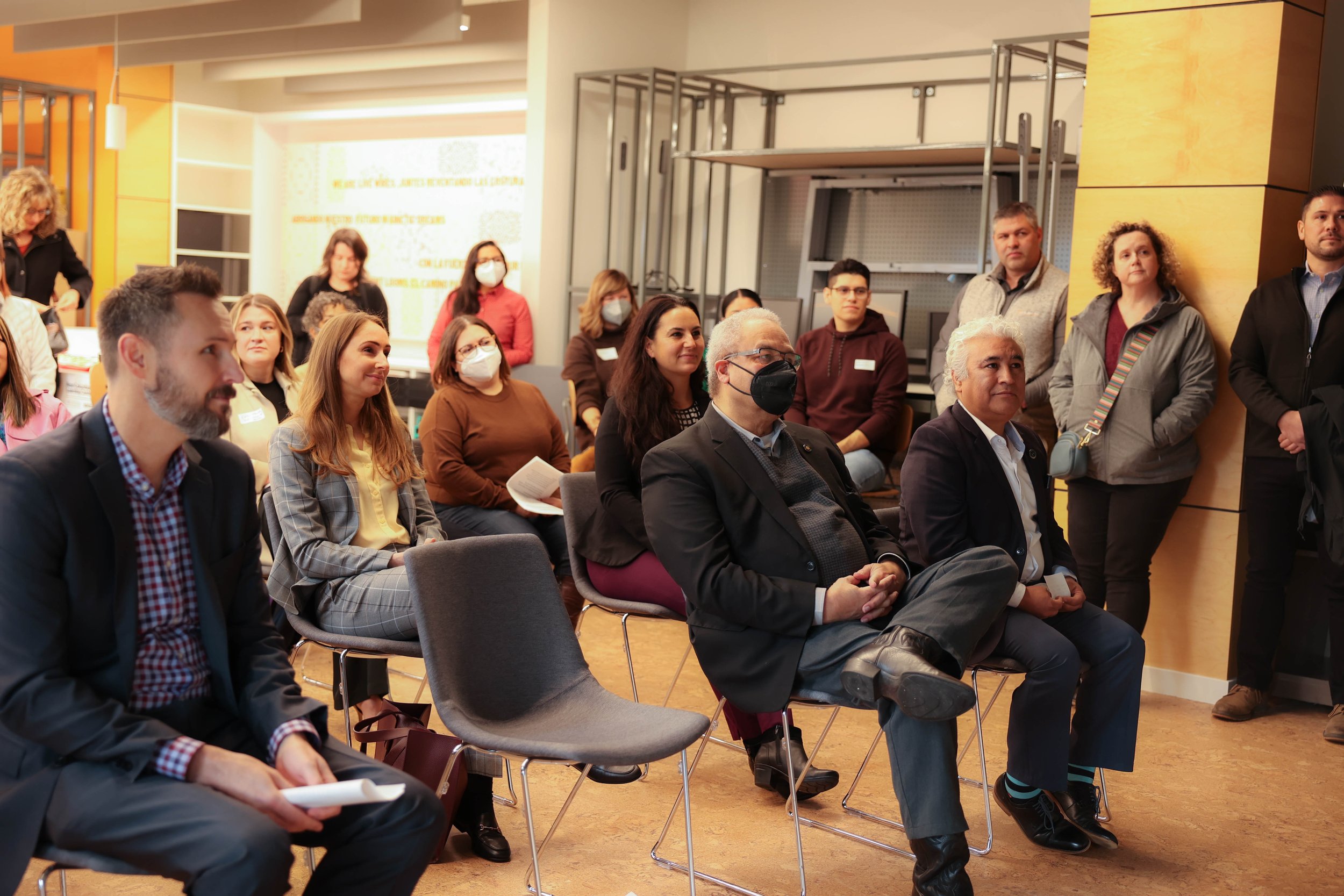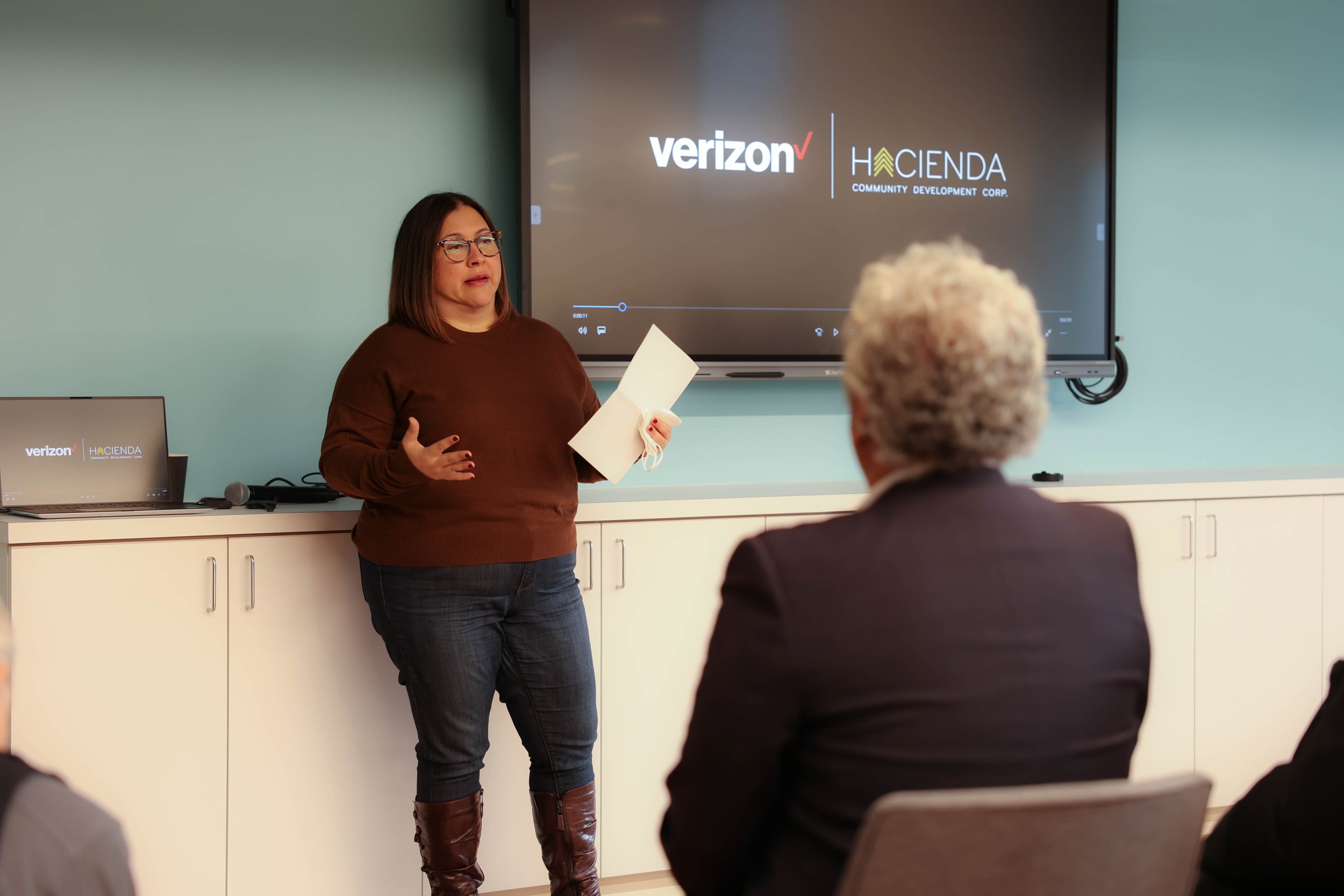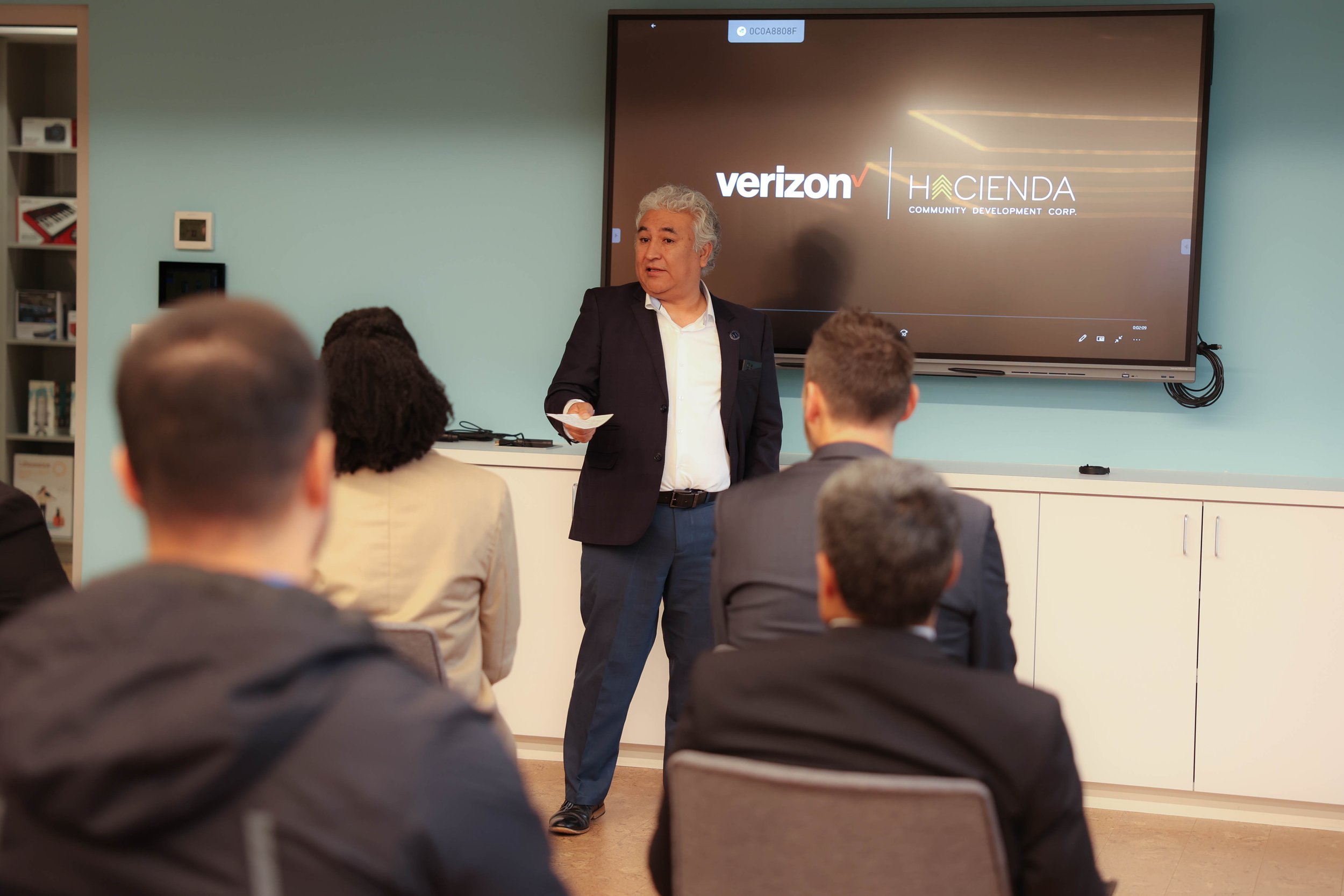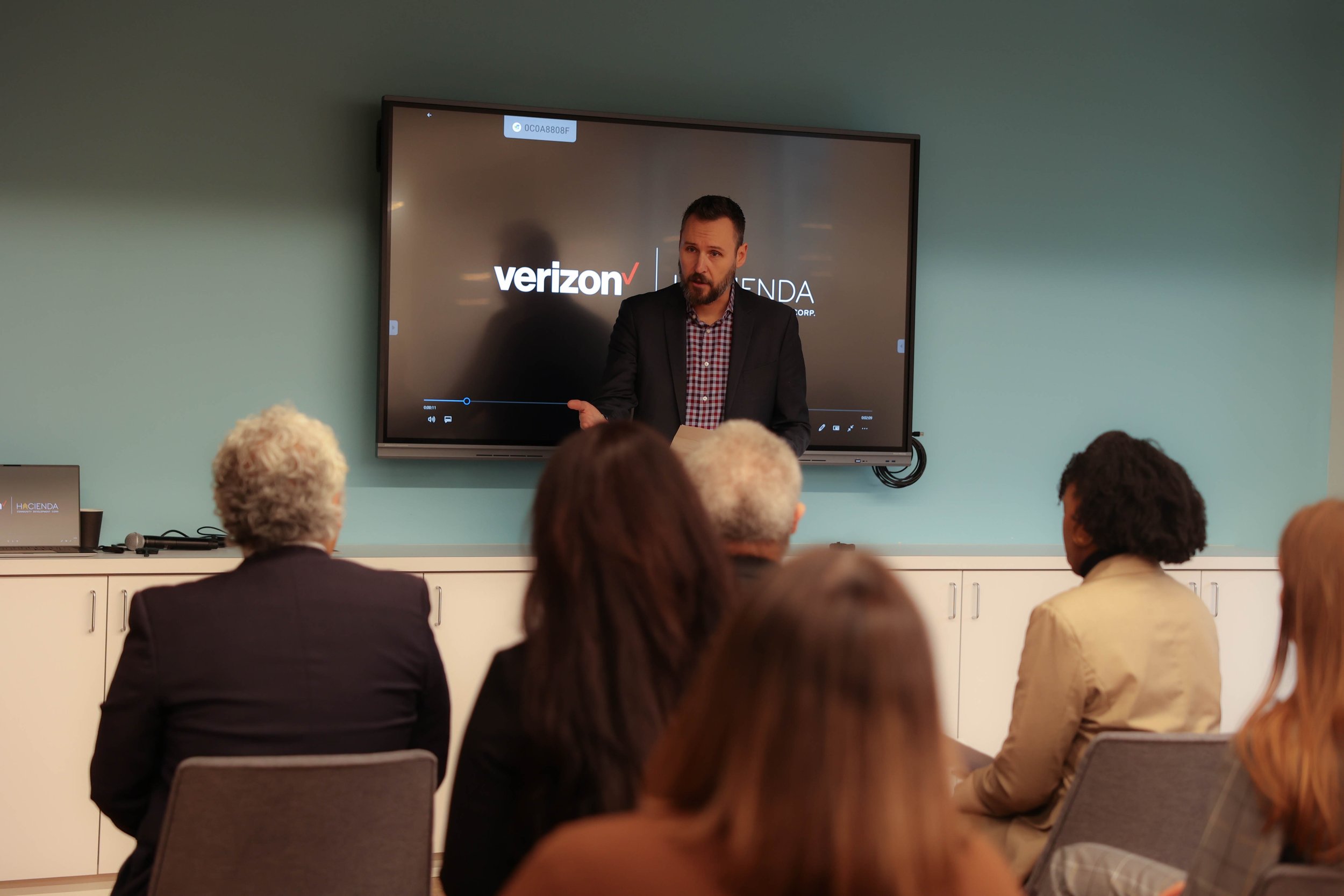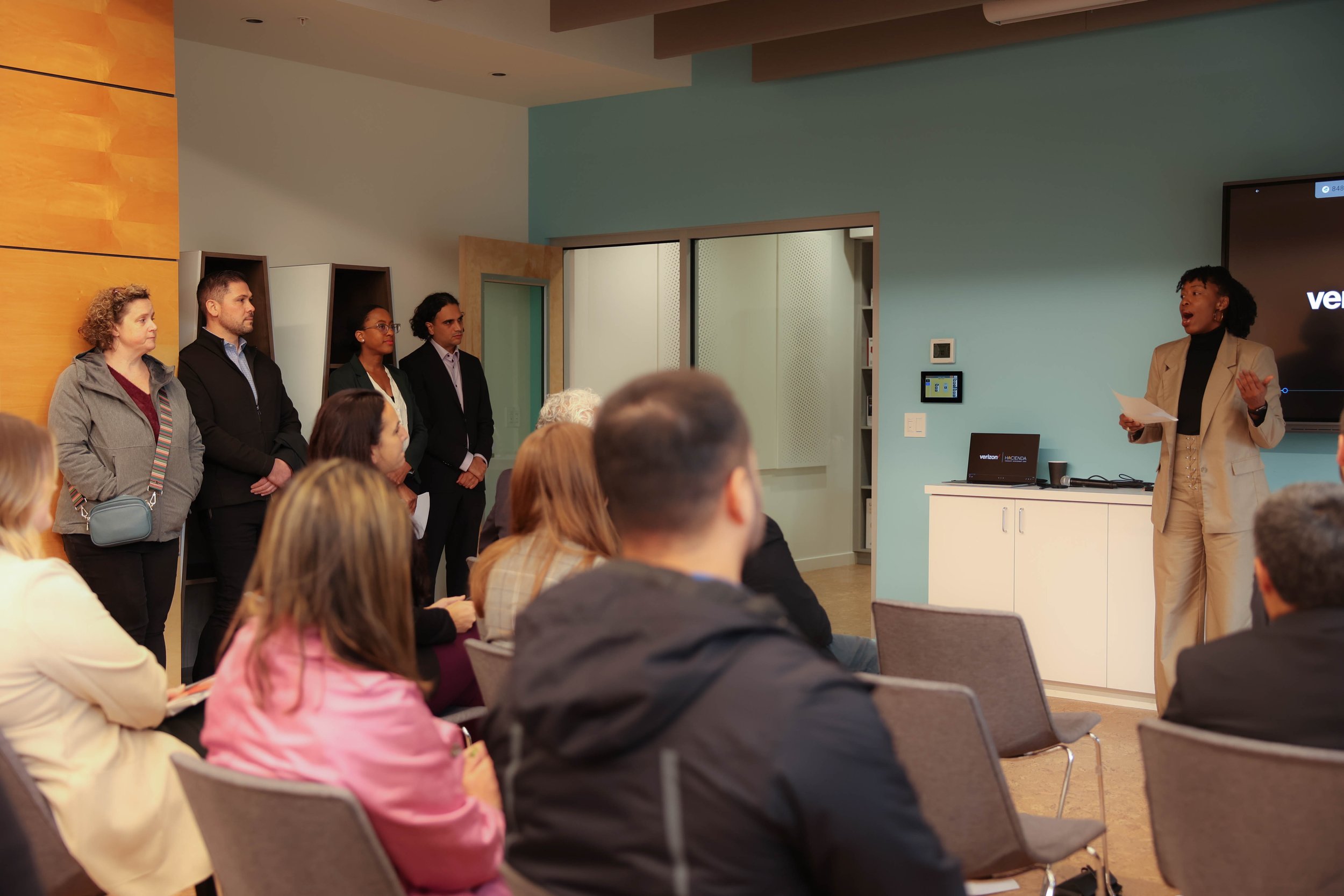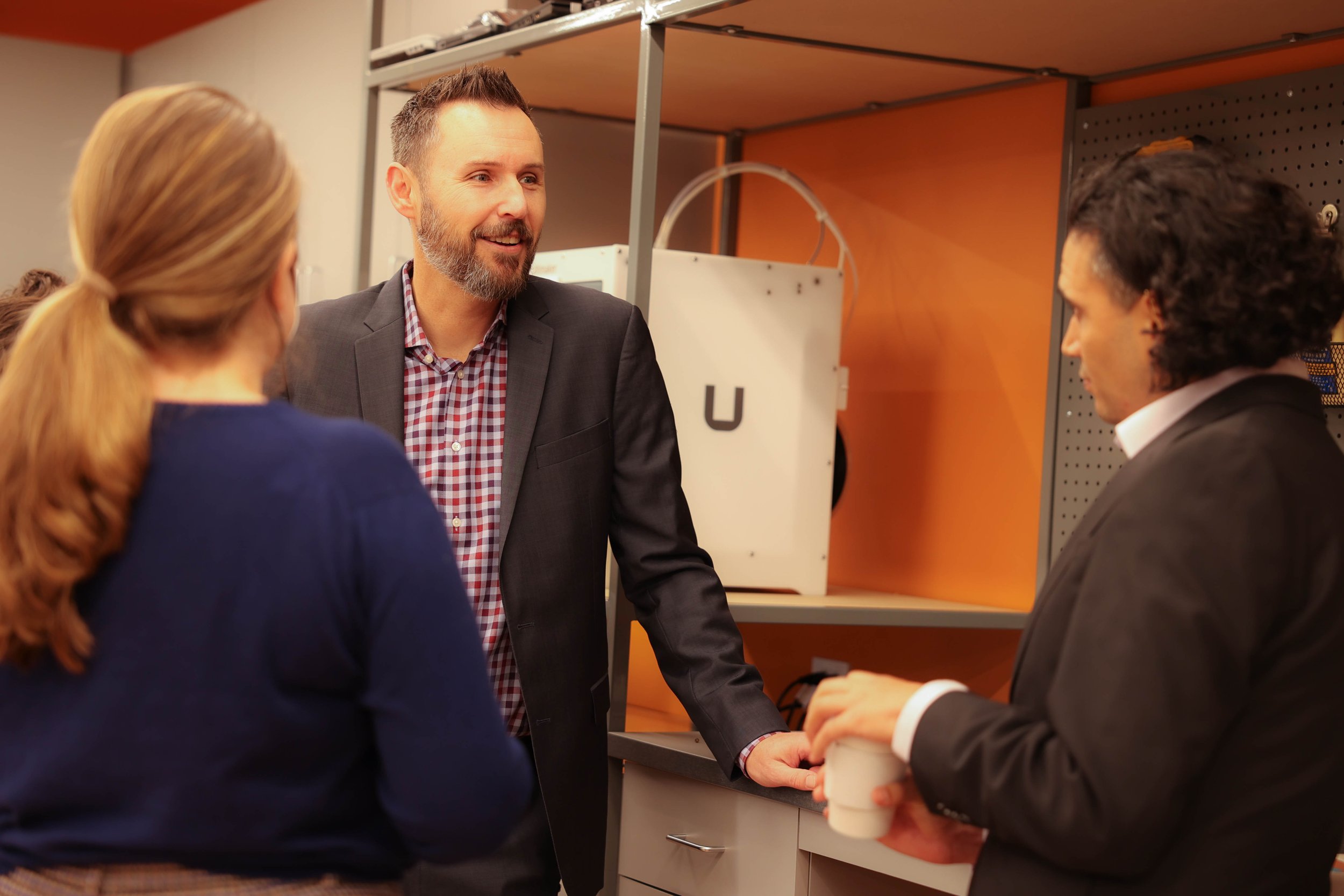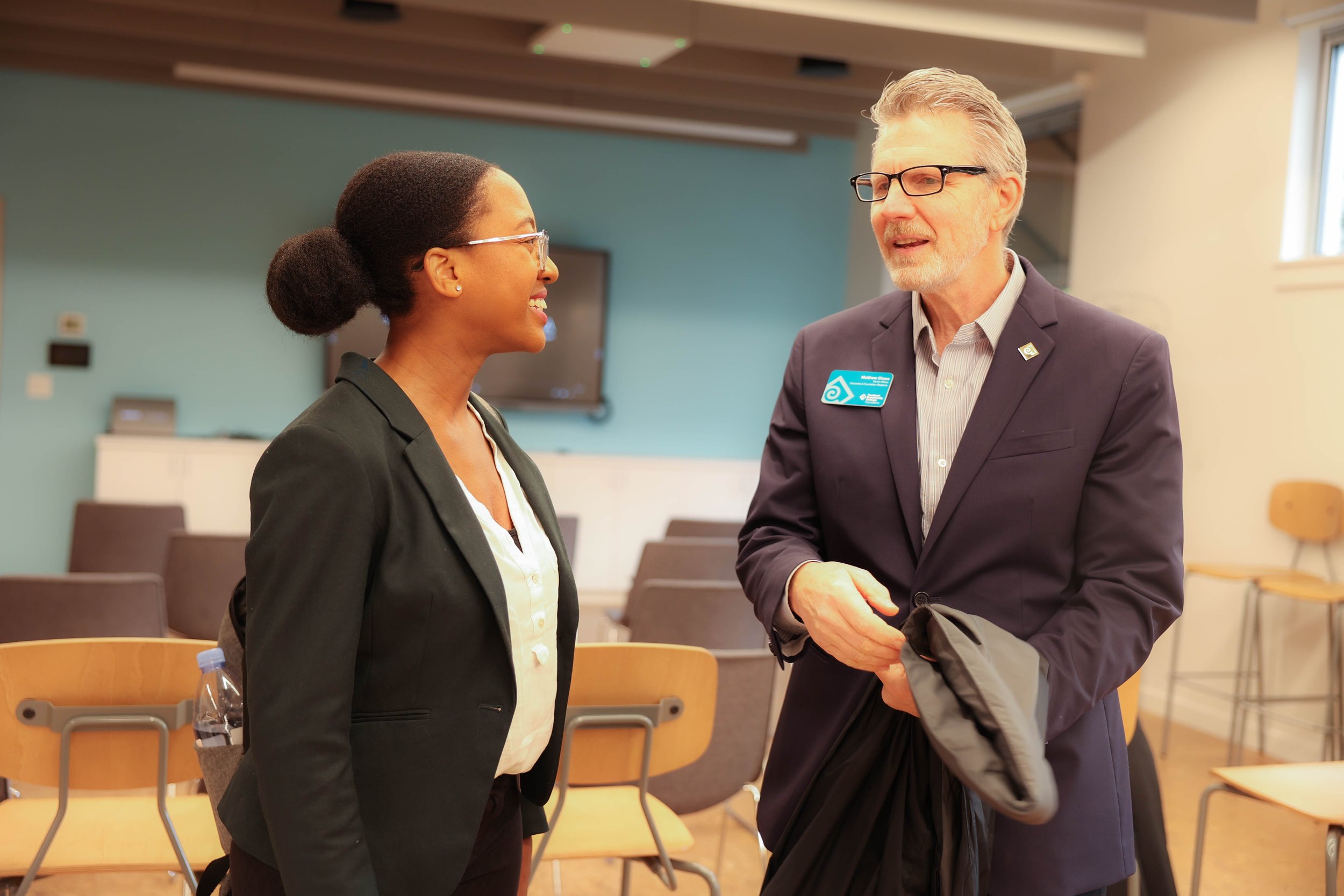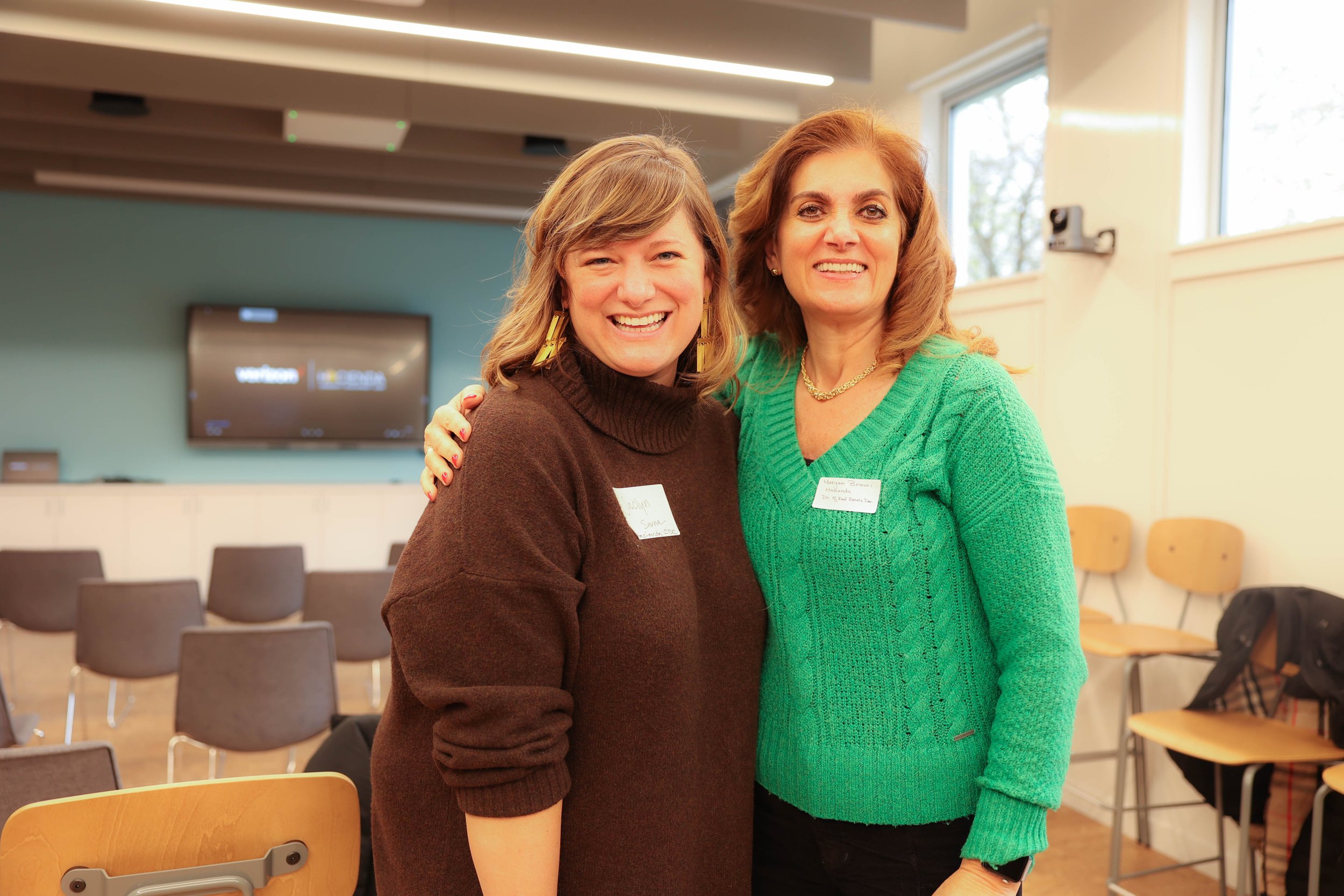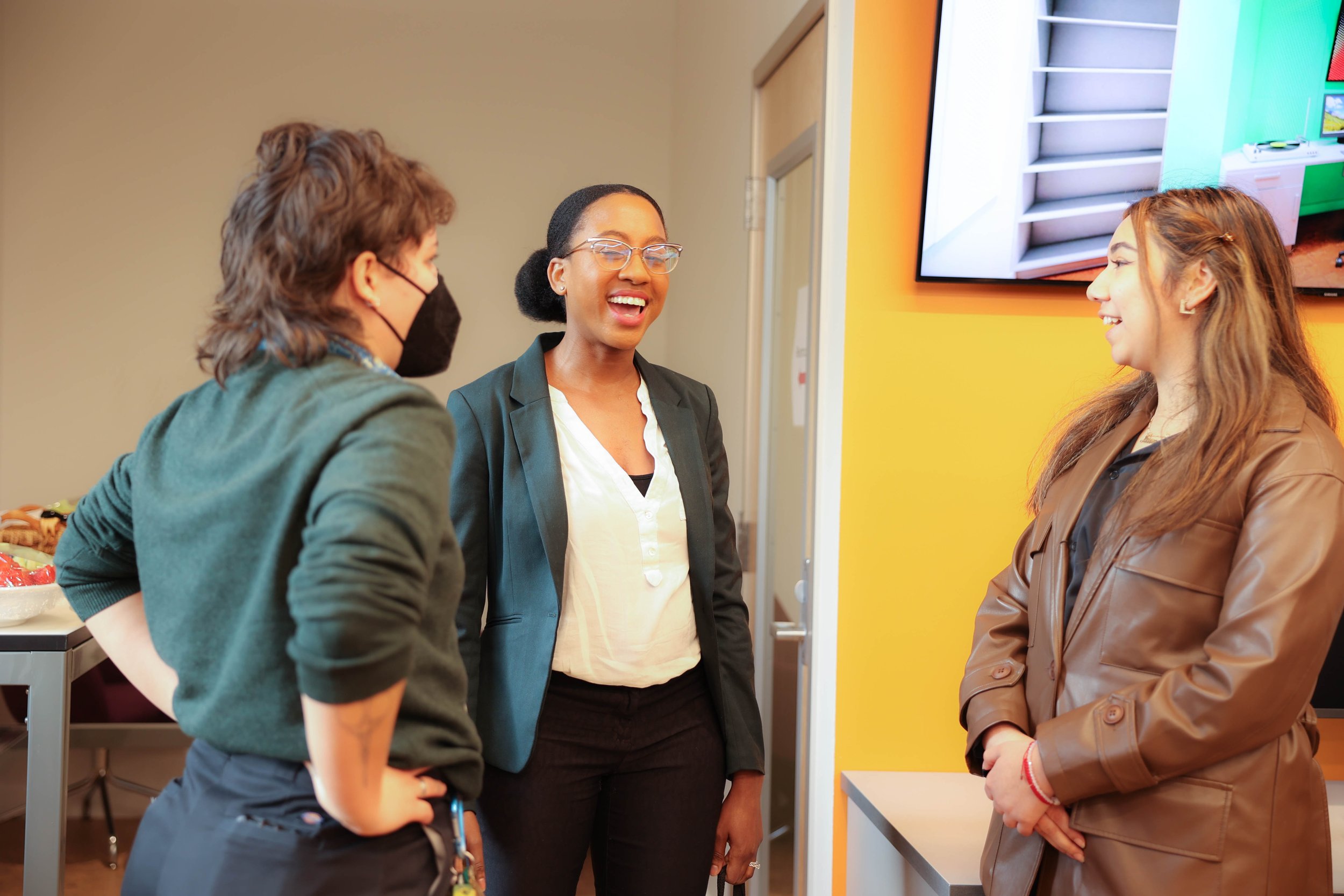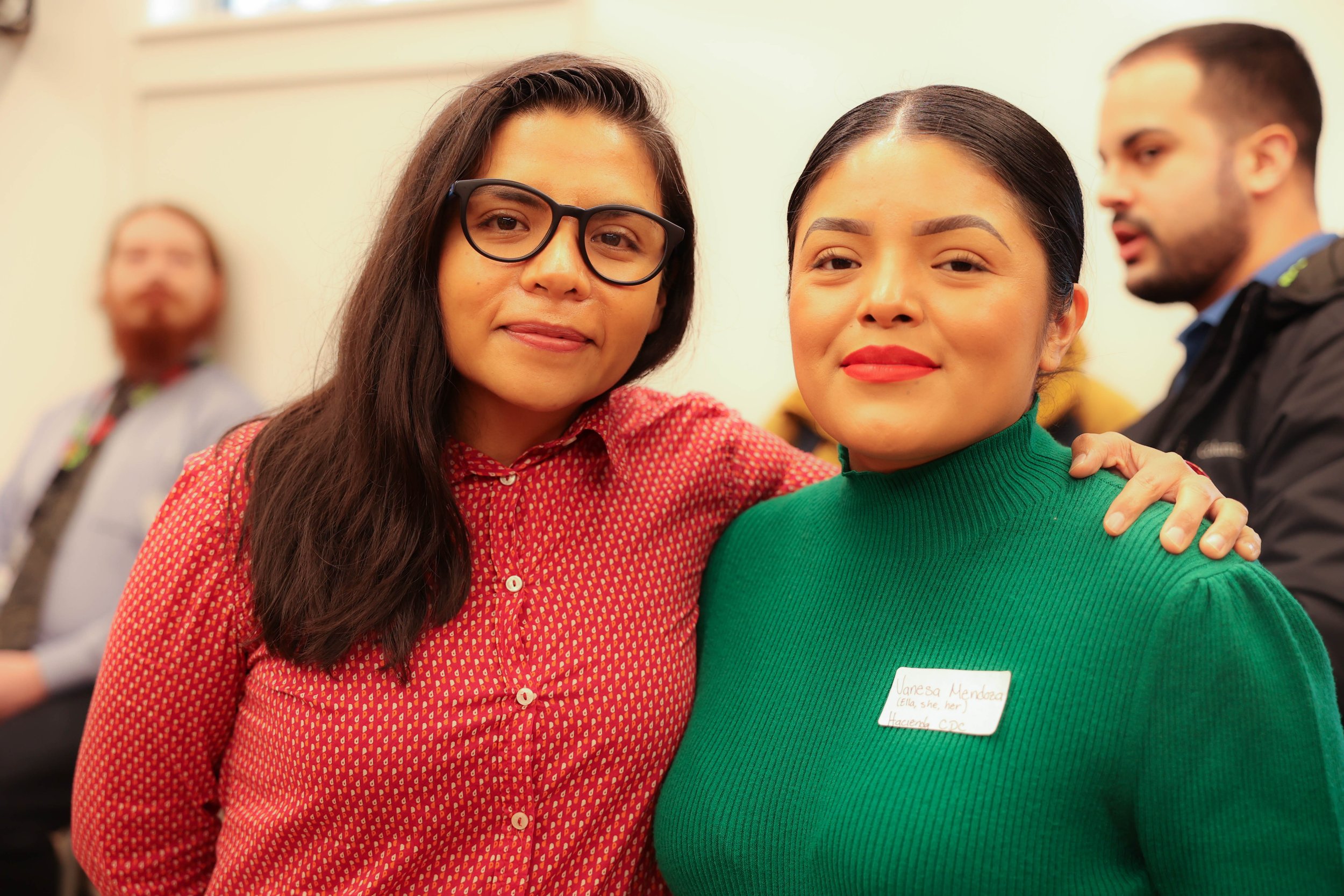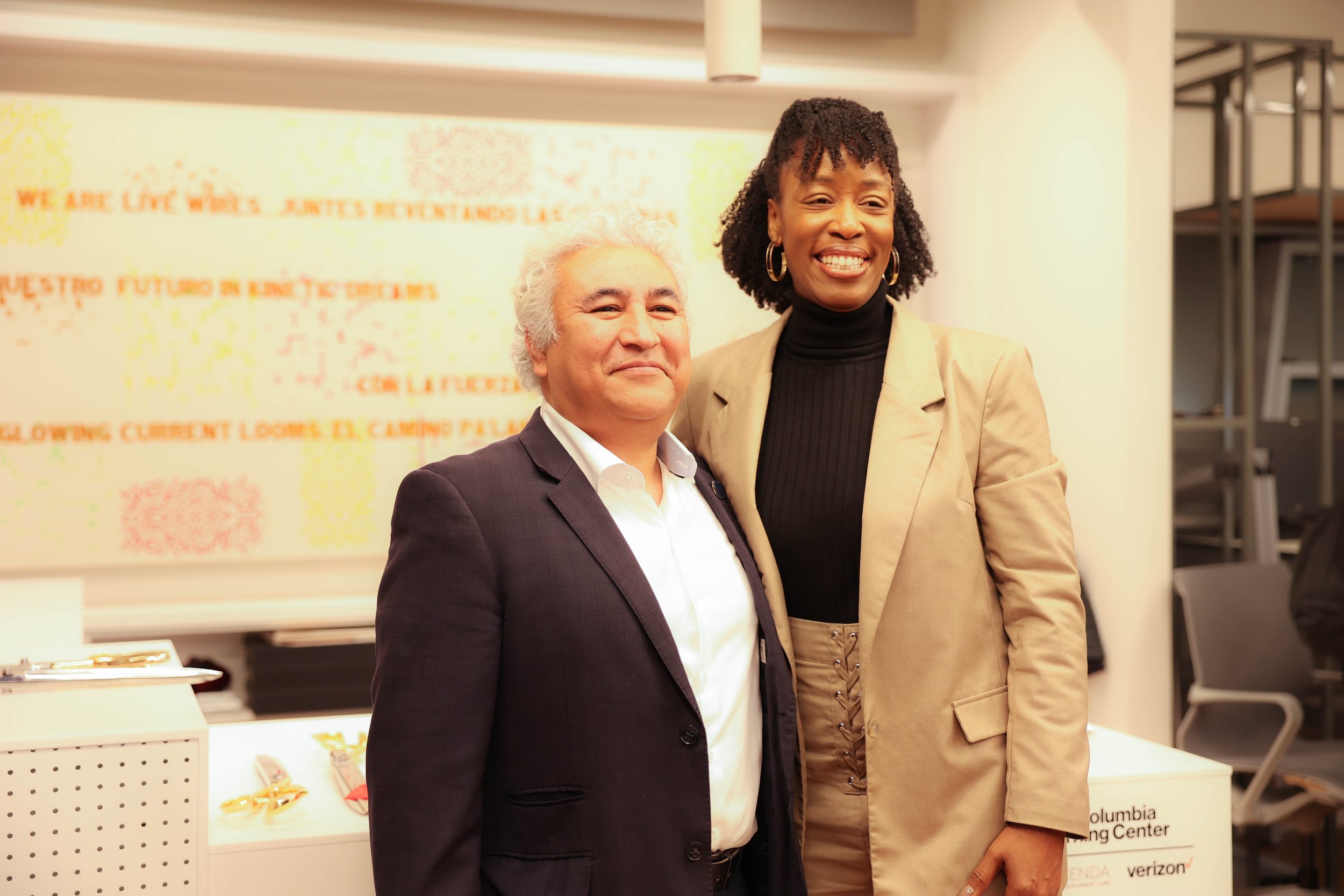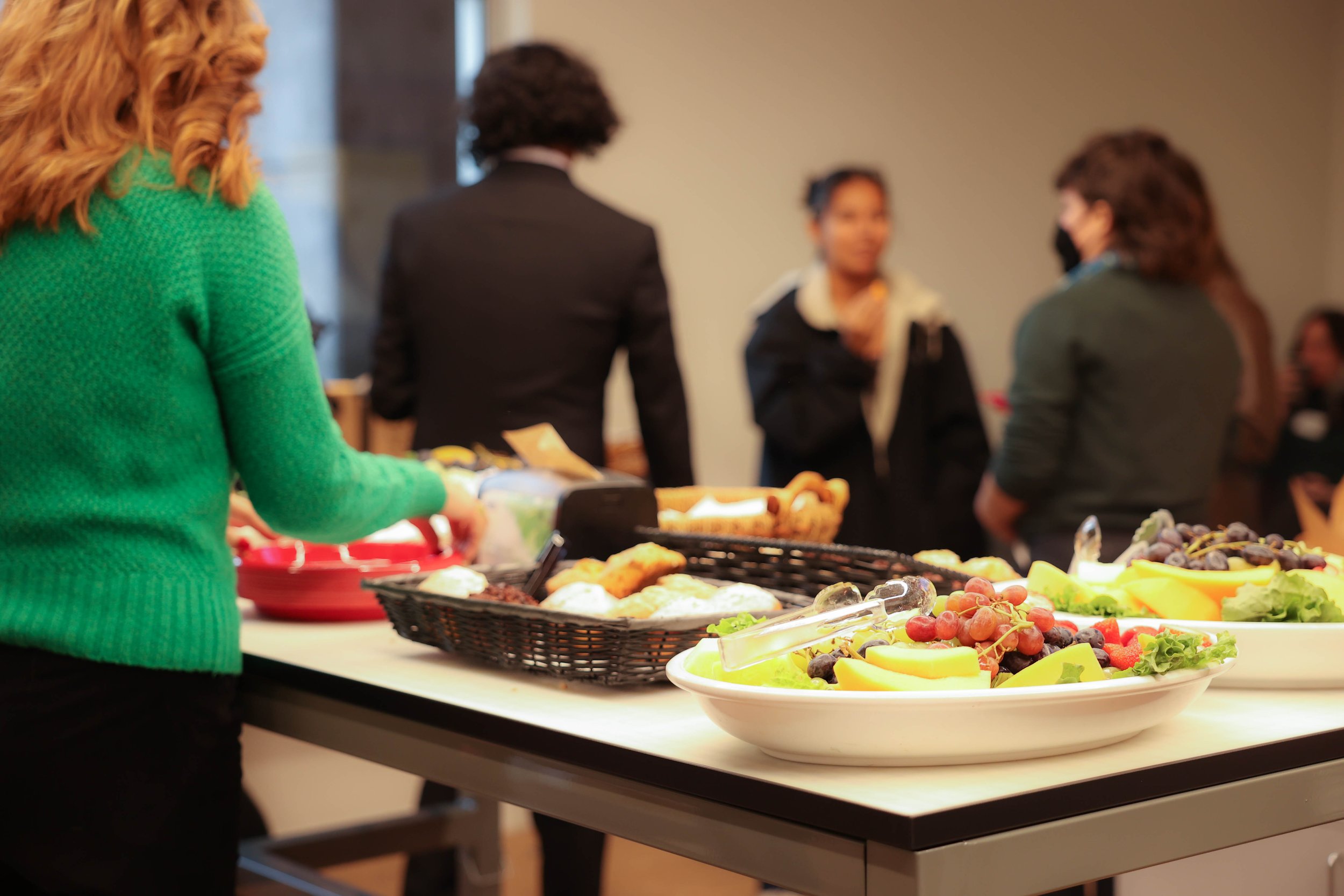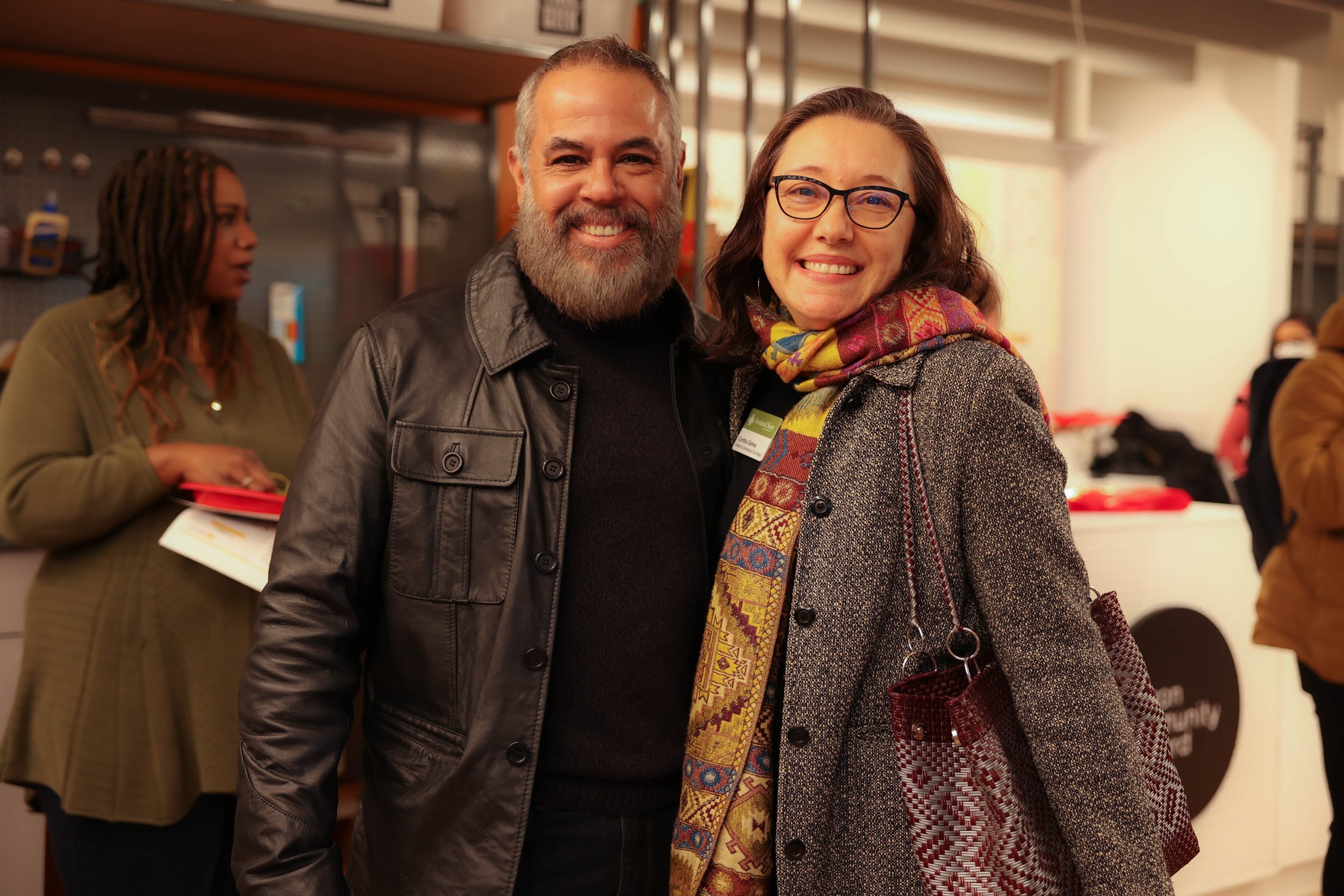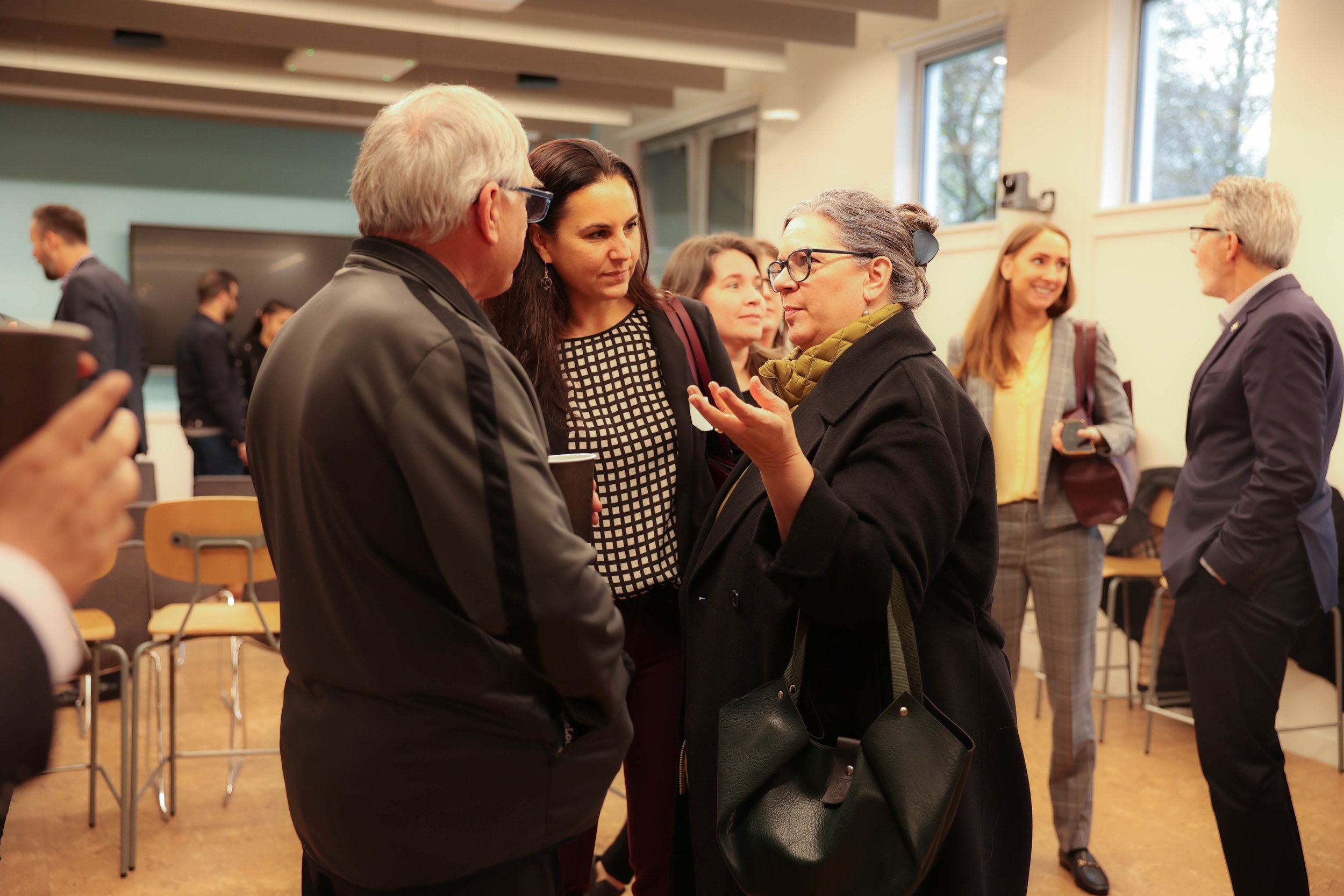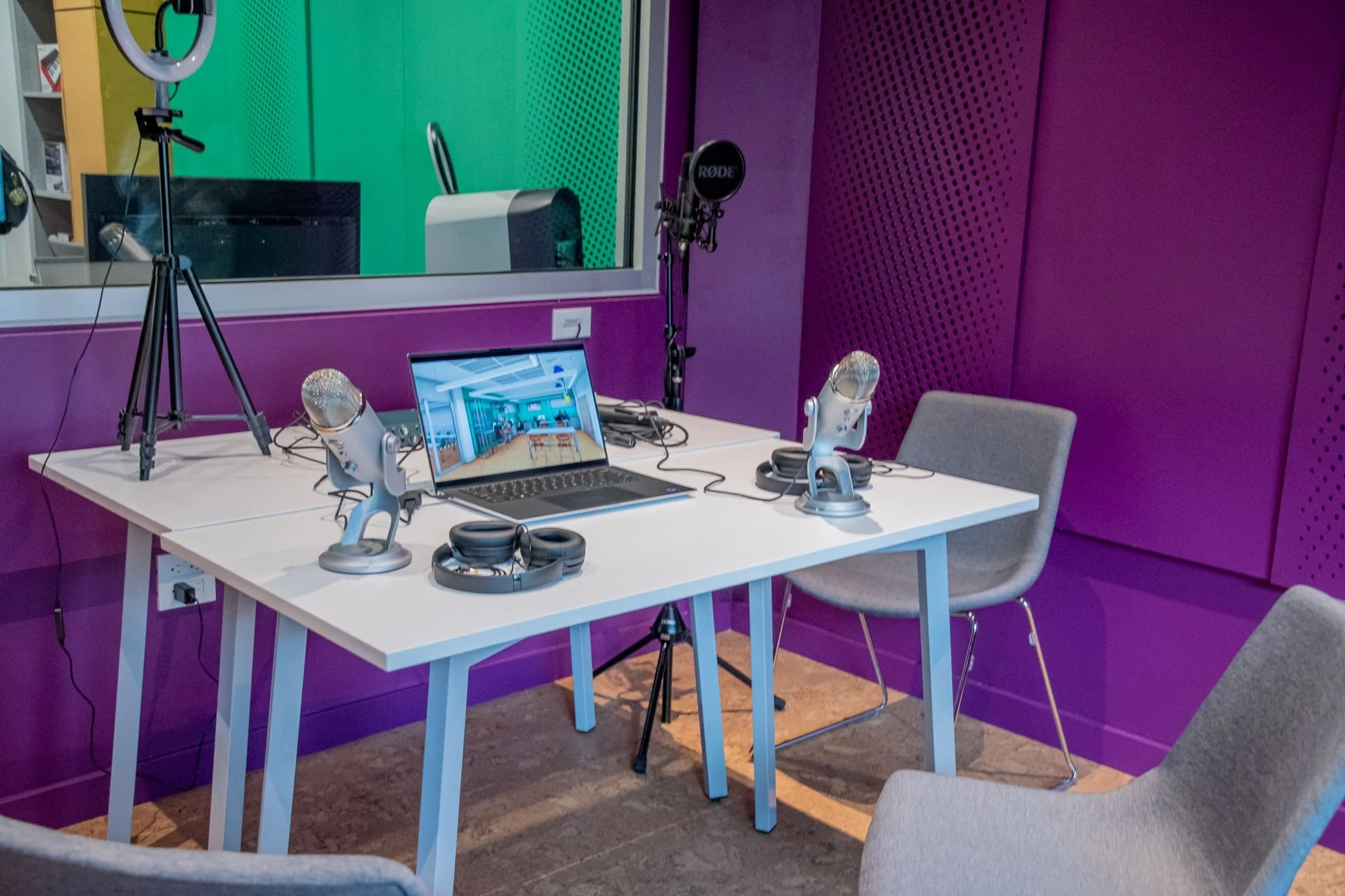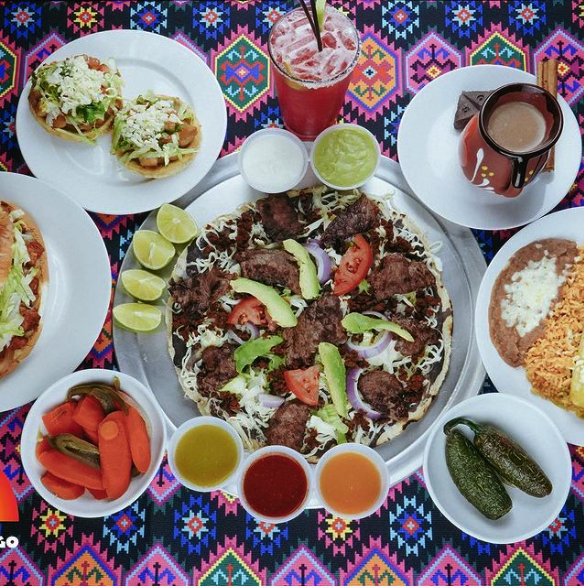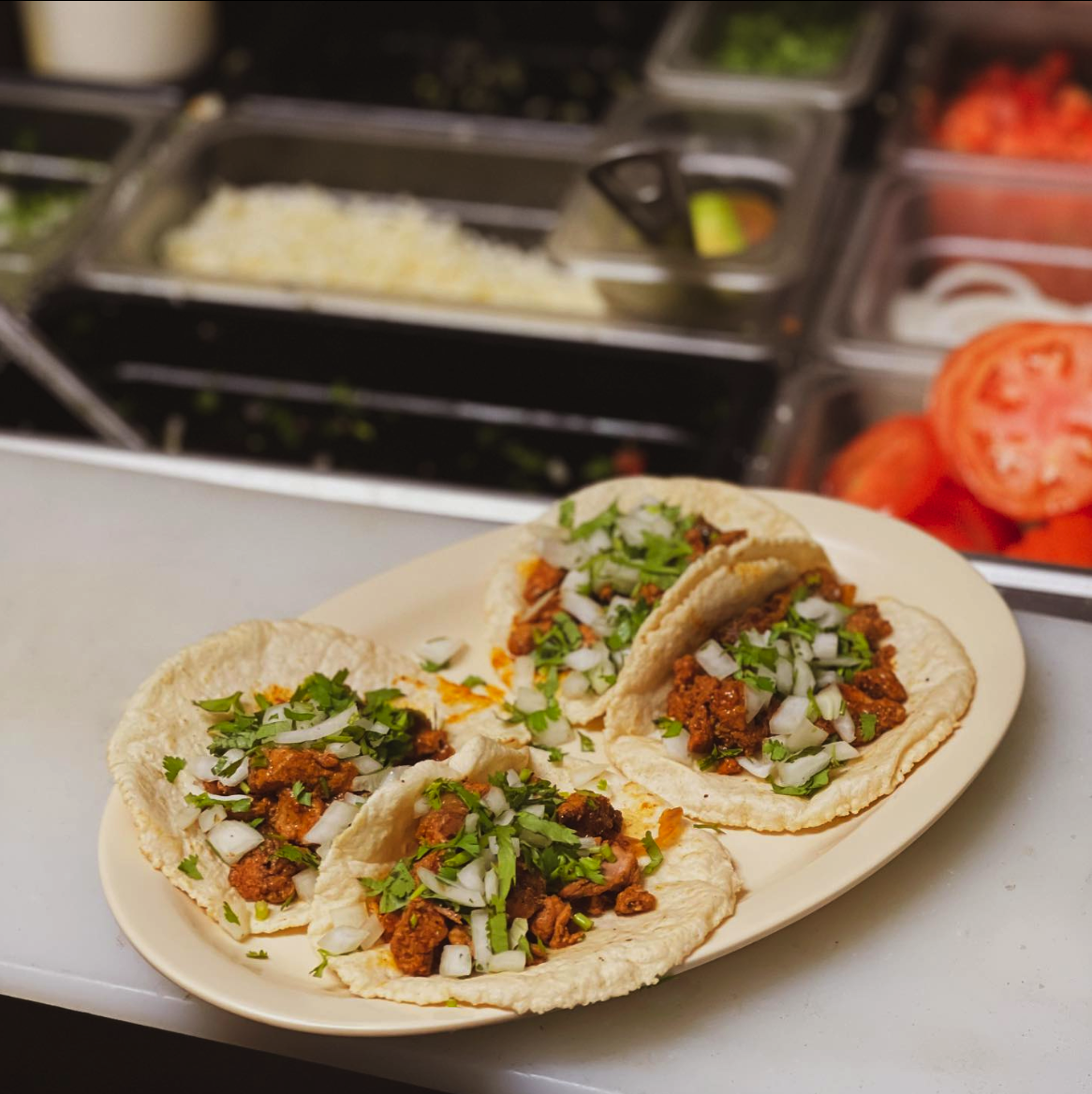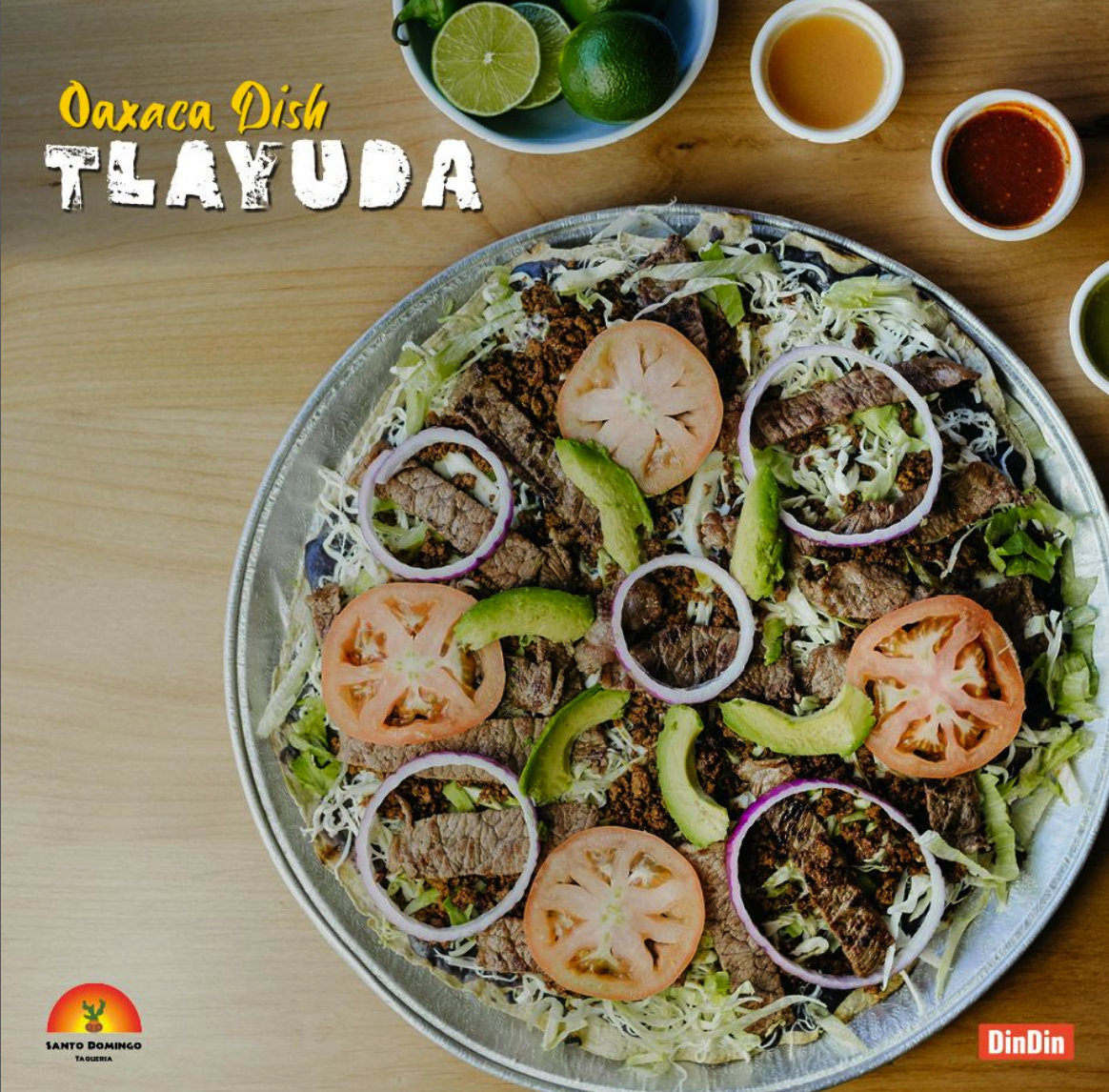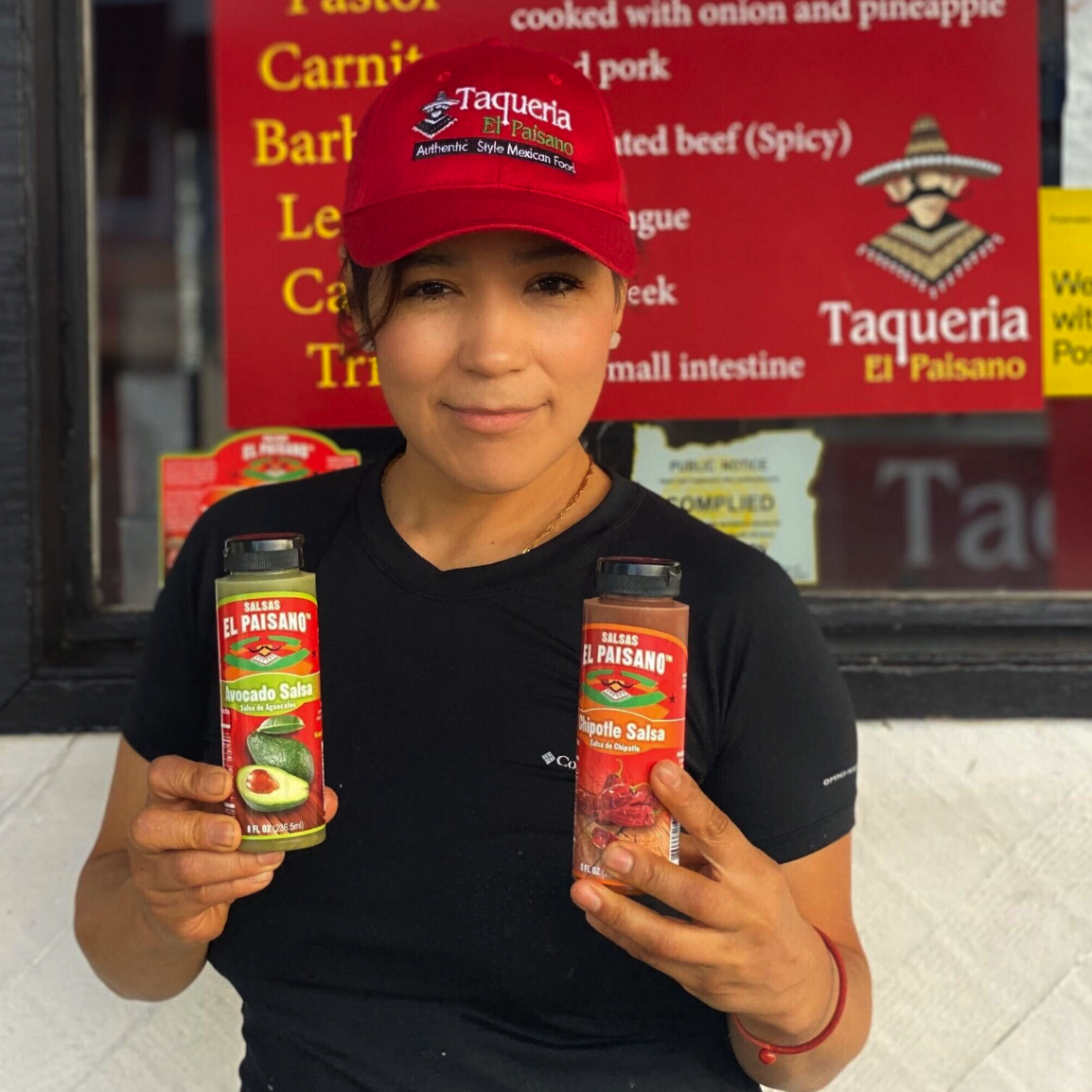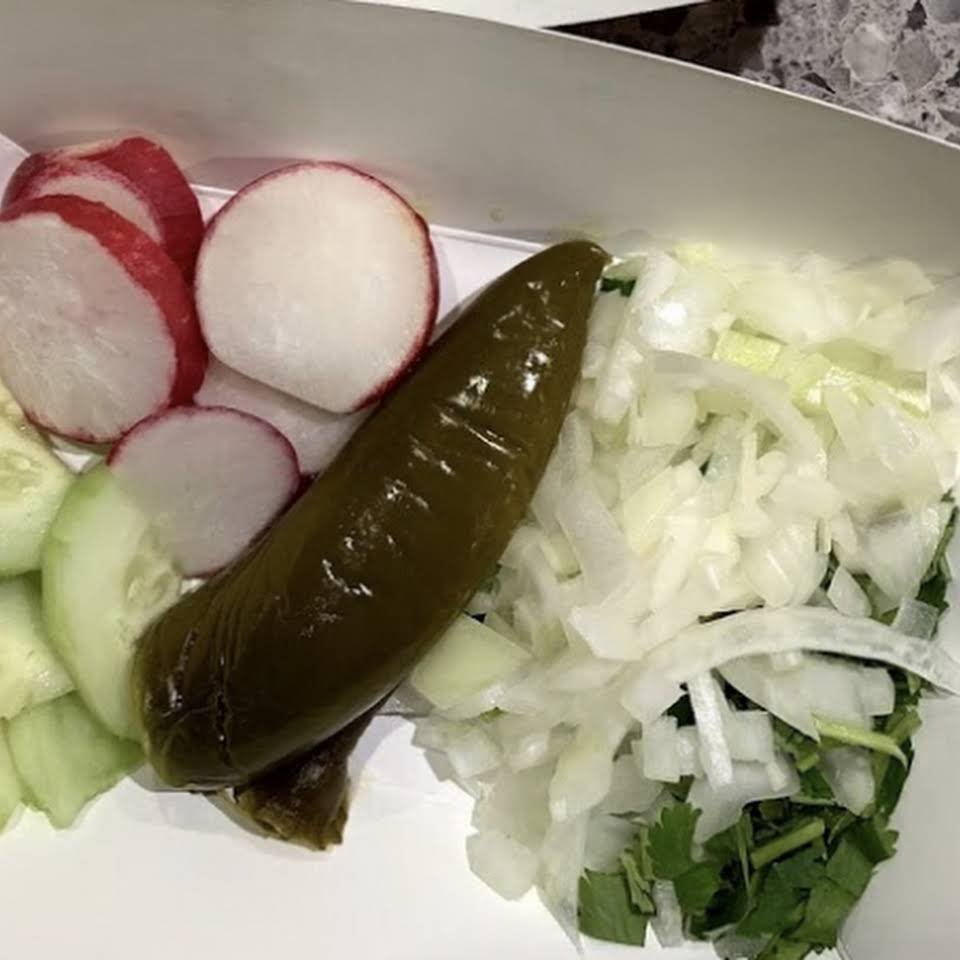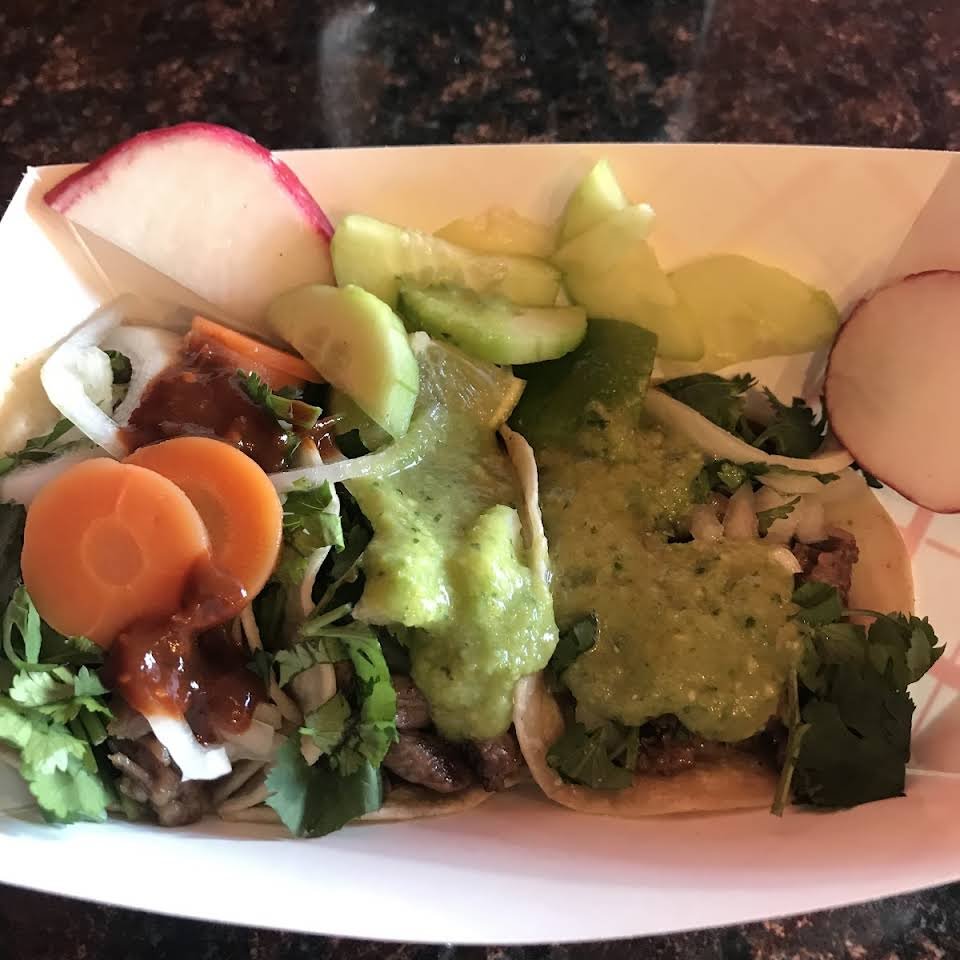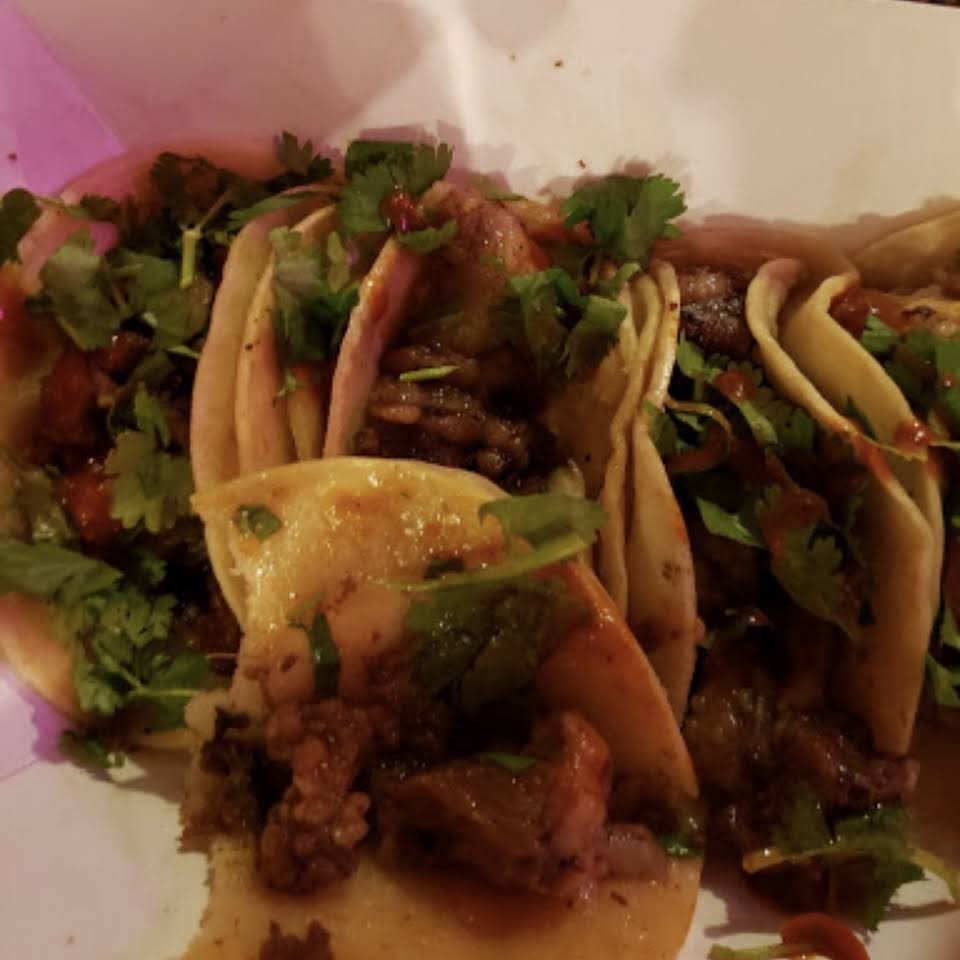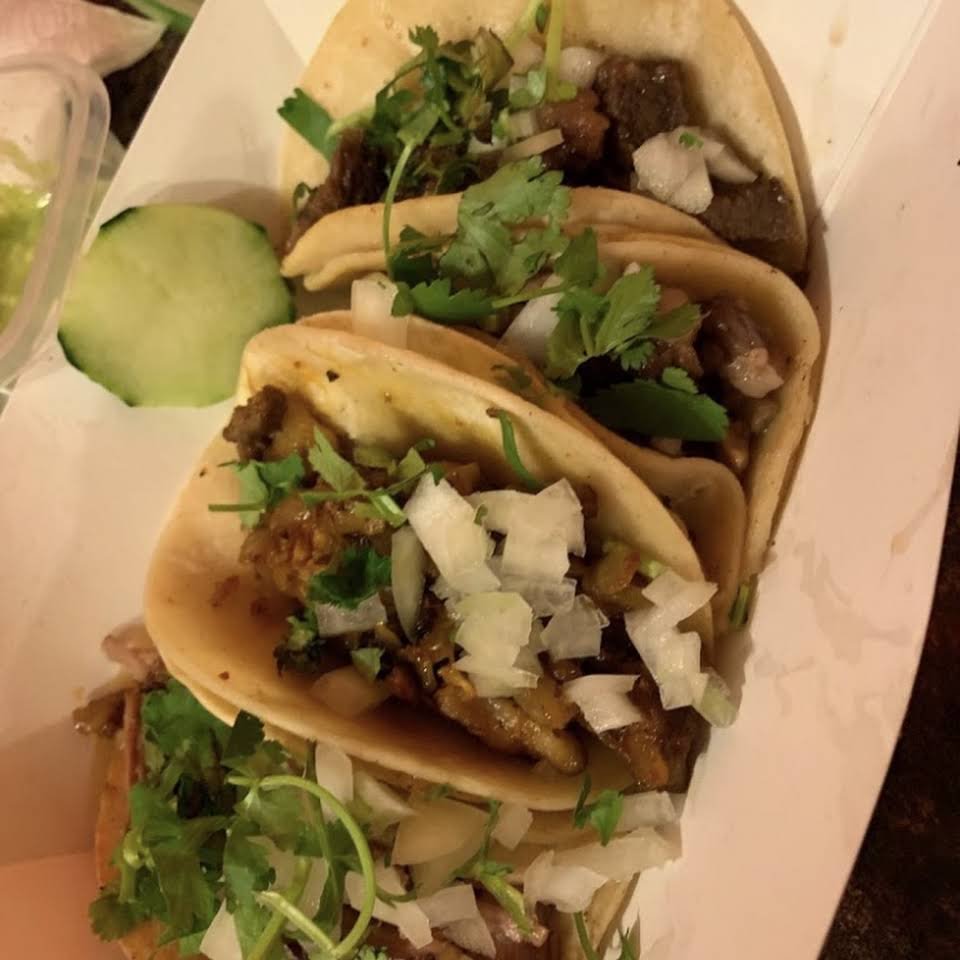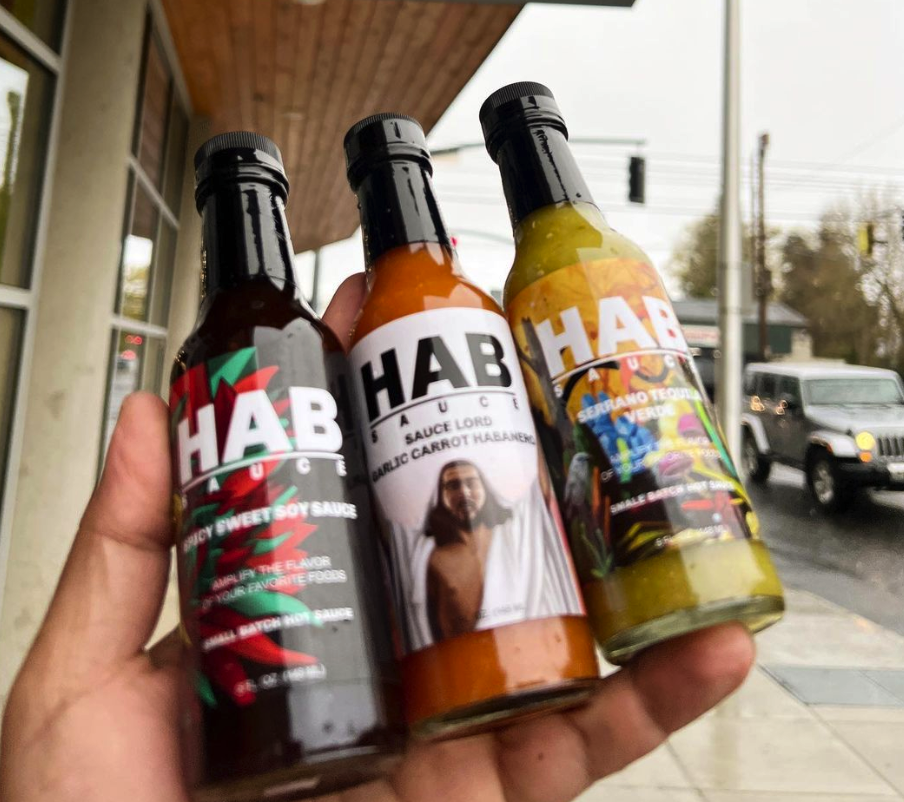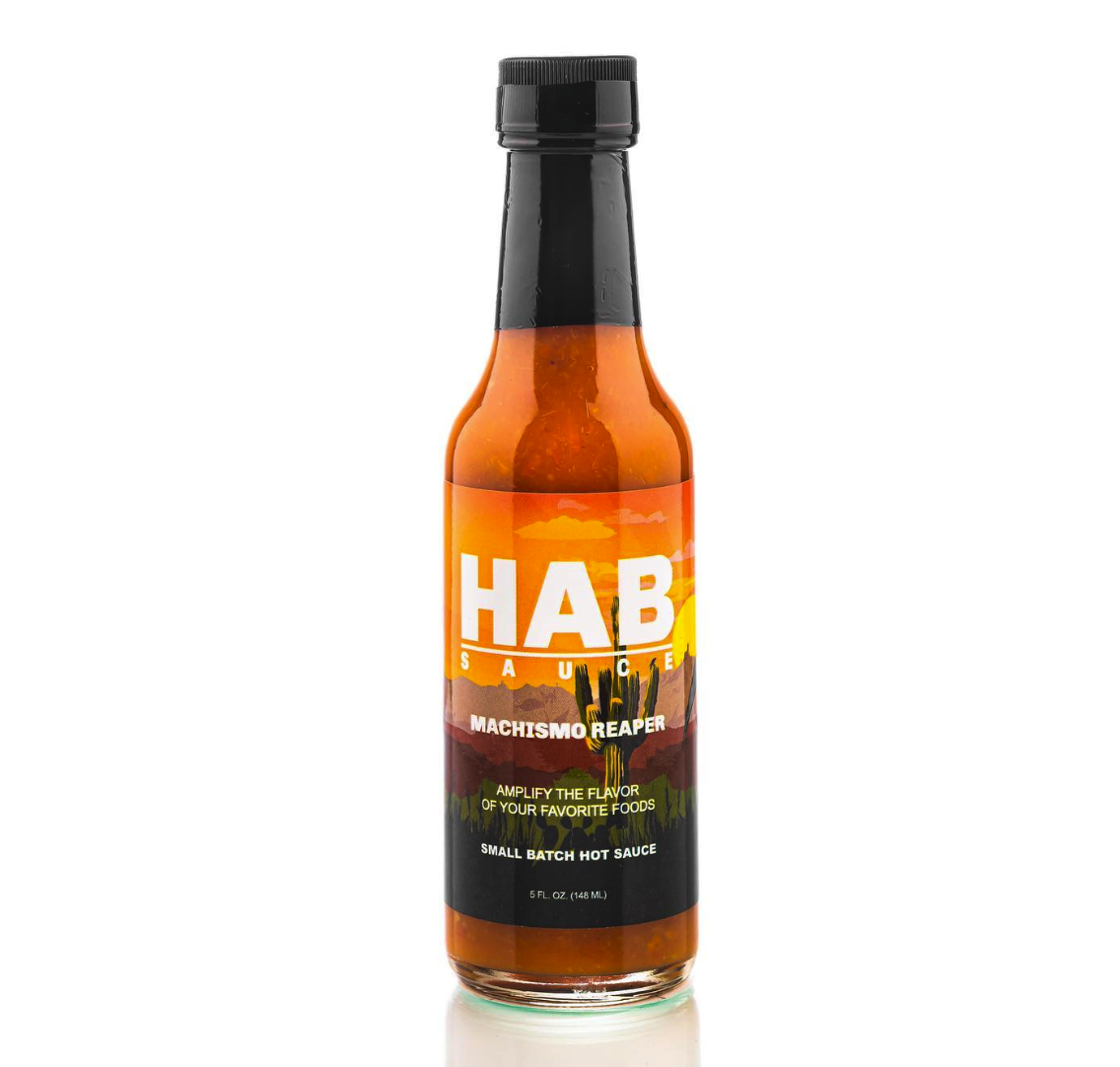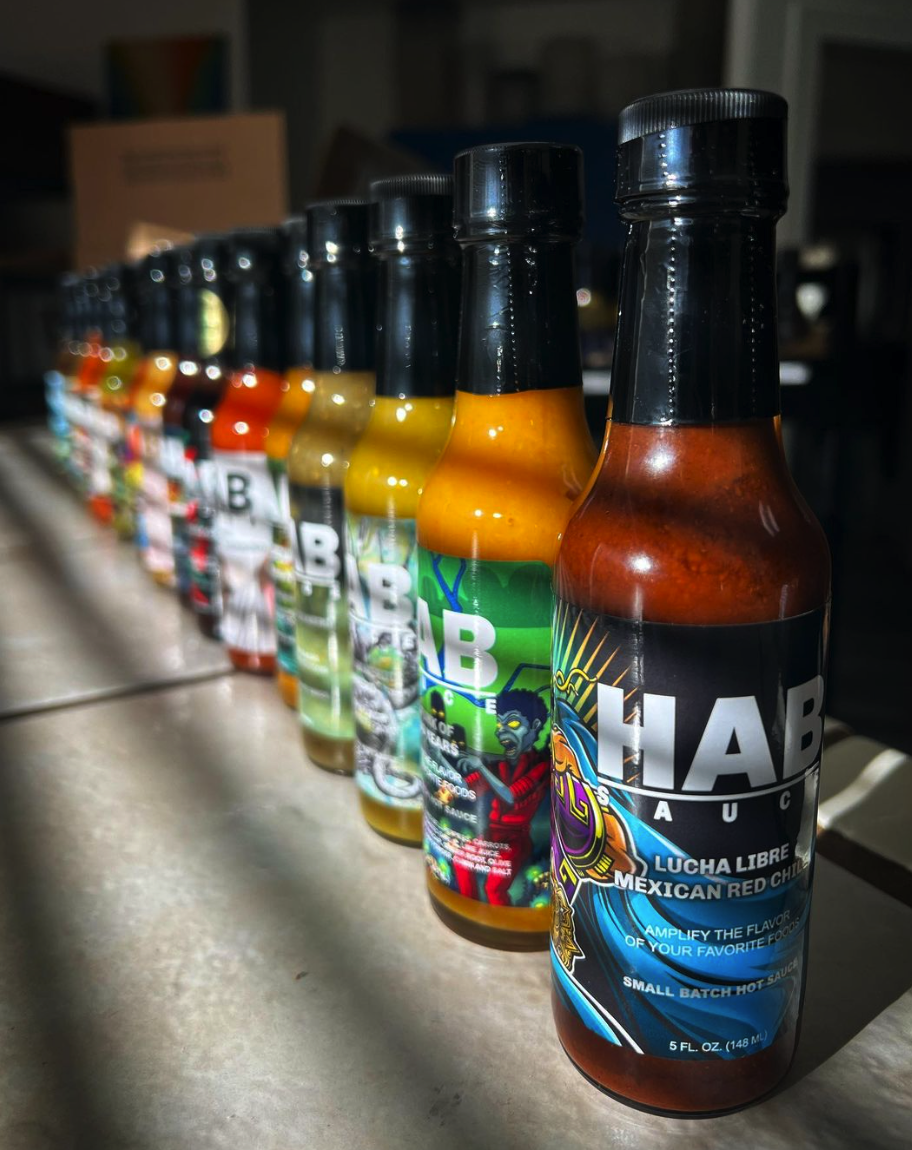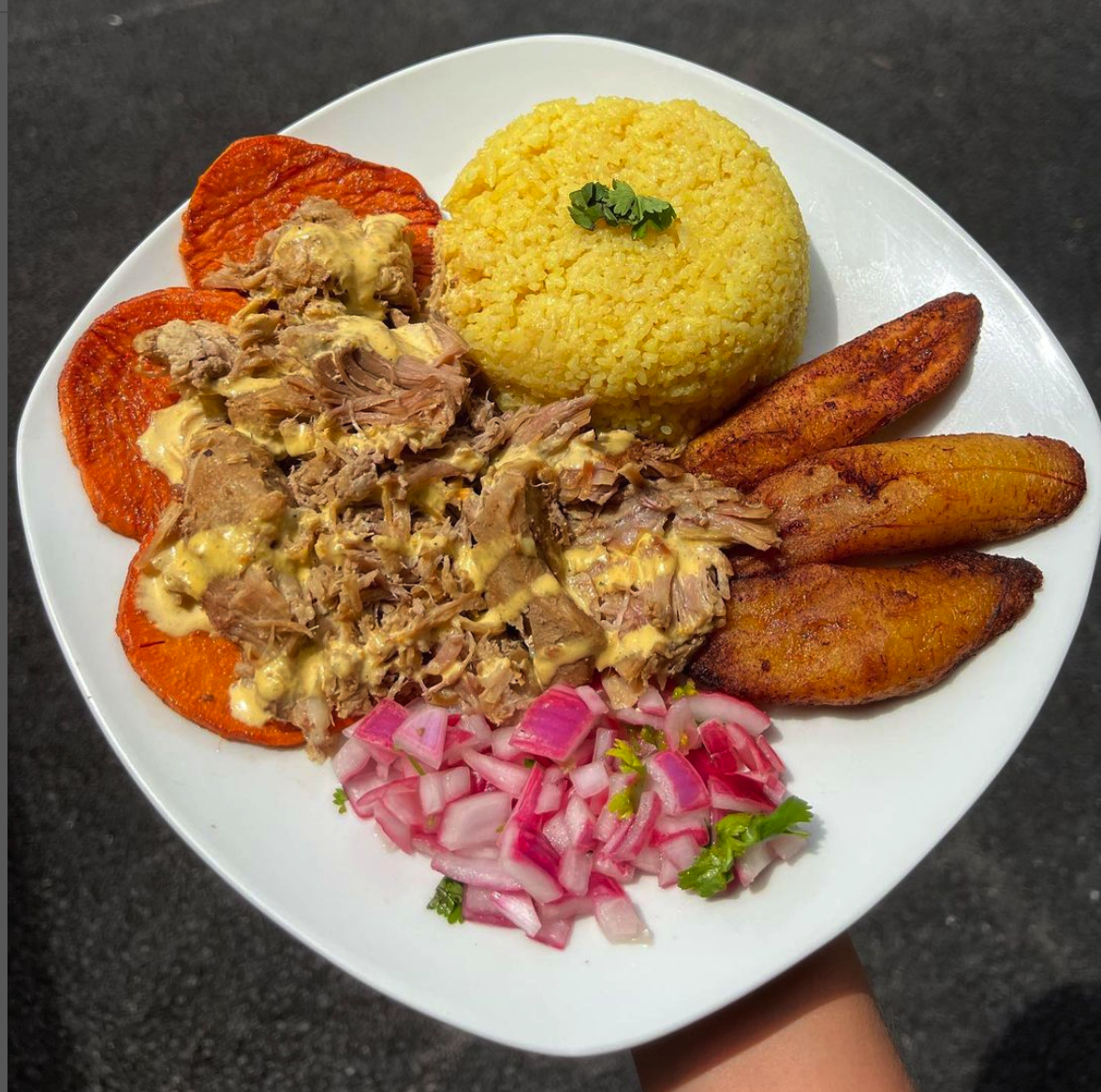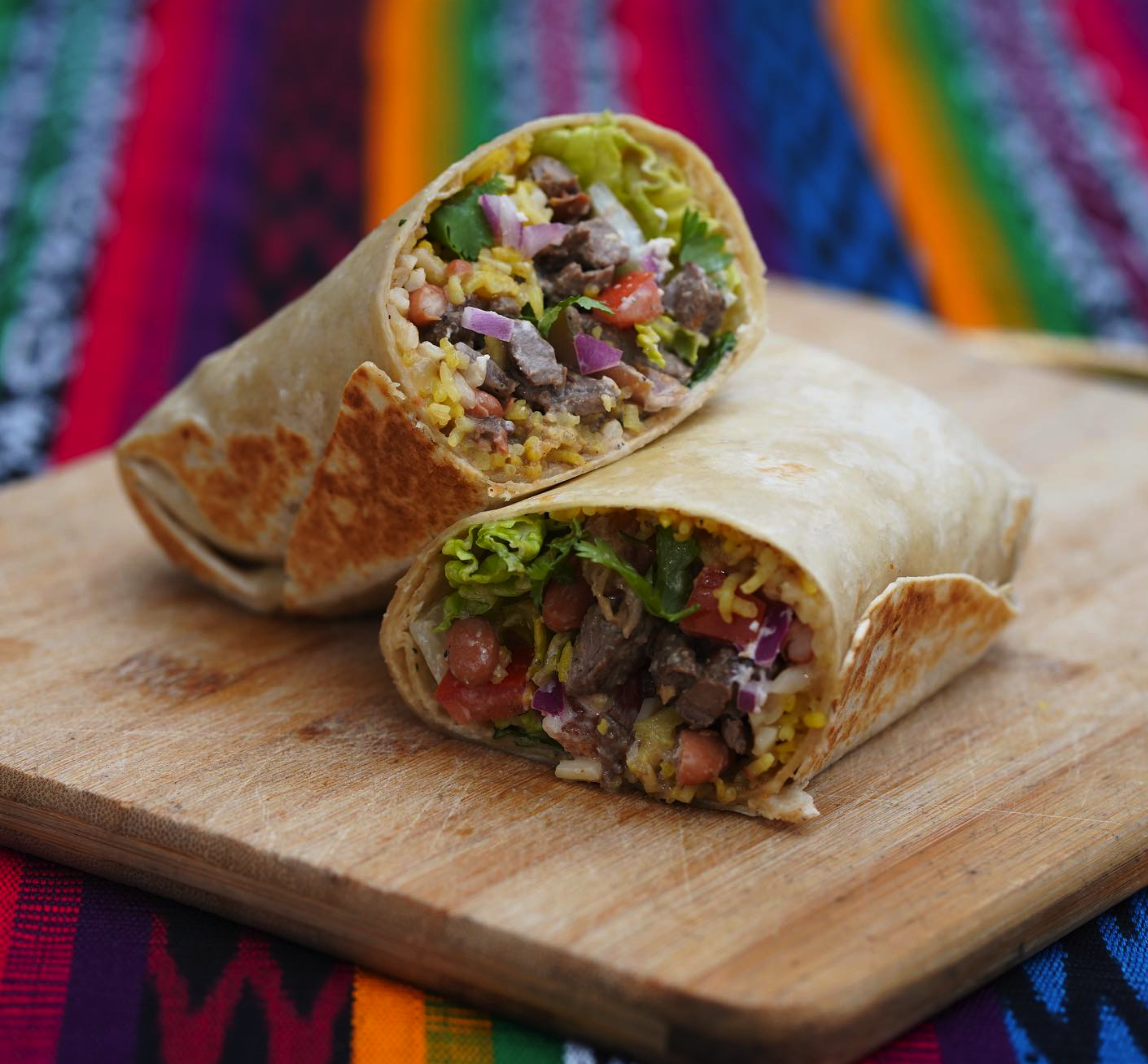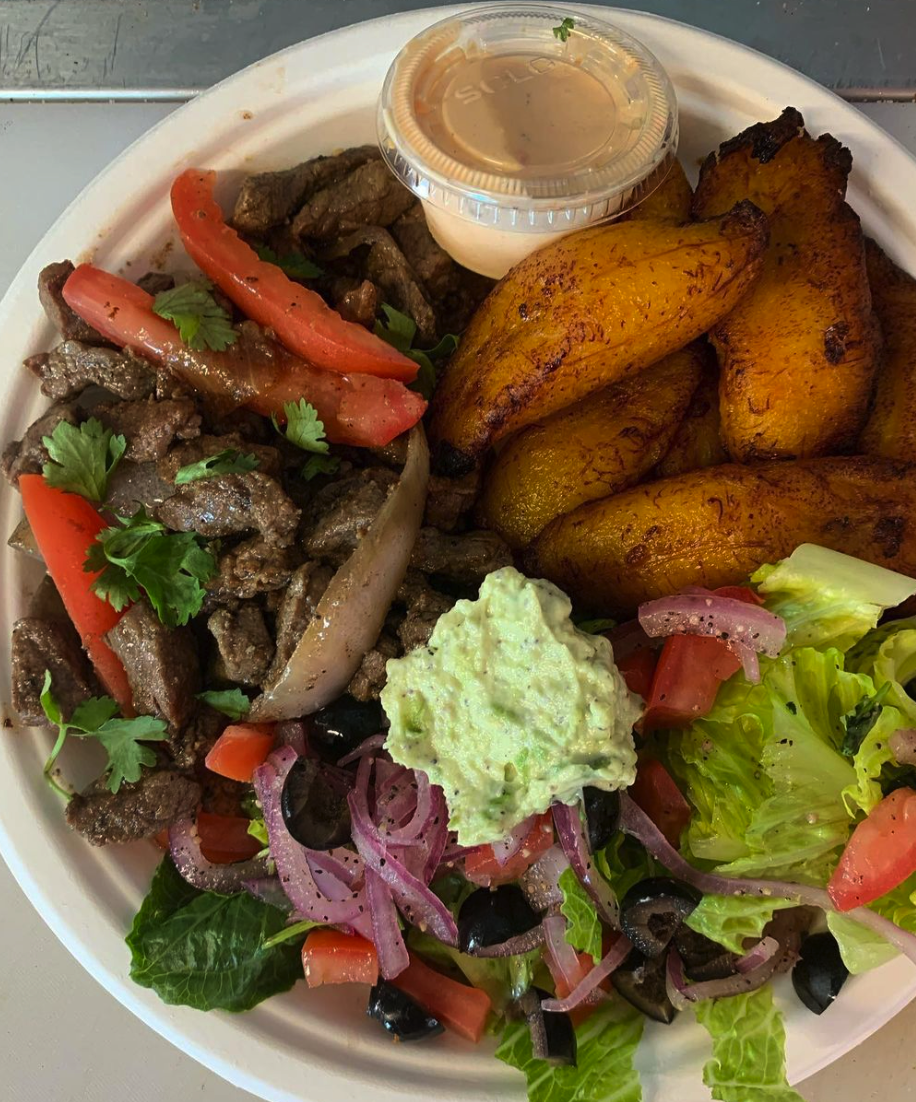Manuela and her family are owners of Loncheria Los Mayas, a staple food cart in the Cully neighborhood, located at Alder Commons. Read more about how she and her family found housing, after-school support, and got on the path to starting their business thanks to support from Hacienda’s affordable housing and holistic programming.
Manuela moved to Portland and hoped to find a safe, affordable space for her husband and three children to live in. Her and her family eventually made it happen when they moved into apartments in Northeast Portland, but soon began facing troubles when their home did not provide adequate living conditions. Her youngest son developed asthma from the walls in their home. This situation caused worry and concern and Manuela knew they would have to move elsewhere to ensure the health of her children.
Although Manuela recognized the necessity to leave their home for the safety of her family, affordability was a priority. Up until that point, she had heard through friends and neighbors about Hacienda CDC and knew about the various programs and services. Community members encouraged Manuela to look into the possibility of renting through the community development organization as it would offer her the opportunity to live in a better environment at a price she and her family could afford. Soon, Manuela and her family of five were welcomed to one of Hacienda’s communities.
Slowly but surely, Manuela regained much-needed hope and began to look into additional Hacienda programming. In doing so, she learned about Expresiones; an after-school and summer enrichment program for youth in Hacienda communities. Even though Manuela helped her three children in whichever way possible, due to her busy schedule and limited schooling in Mexico, she knew she needed additional support for their academics. Her daughters soon obtained on-site homework help from bi-lingual and bi-cultural staff that understood them and their community and had a safe place to go spend their time after school.
Both Manuela and her husband Freddy aspired for more and wanted to build something of their own for their family. Since moving to the United States many years ago, they always dreamed of starting their own business and fulfilling this desire. With a goal and ambition in mind, they began saving to pursue this life-long dream. They soon found it difficult to navigate the many steps of starting a business alone.
“I feel like when you start something big it’s like walking in the dark...Hacienda is a like a light, a beacon, that appeared on the road”
It was at this point that they looked into the Mercado Empresario’s program, Hacienda’s program to support small businesses, from raising captial to business advising and provides bi-lingual and bi-cultural technical support to clients. Once they began the program themselves, they found clarity and a sense of direction to continue on their journey and start their own business with confidence.
In 2016 they opened Loncheria Los Mayas, a food cart in the Cully neighborhood inspired by Manuela and her husband’s indigenous Mexican roots. This one-of-a-kind food cart can be found in Alder Commons where guests enjoy authentic regional foods—from a classic Yucatan Panucho to handmade tortillas. Every dish at Los Mayas celebrates their love for their home country and is a testament to their culture and their dreams.
Loncheria Los Mayas is far more than just a food cart. As Manuela says, “Our dream is to teach people about our culture and traditional flavors originating from the Mayan times.”.
Manuel now encourages others to learn more about Hacienda, as it is more than just proving affordable housing. She that Hacienda supports many facets of a person’s life and reflects on the support she received by saying, “I feel like when you start something big it's like walking in the dark...Hacienda is a like a light, a beacon, that appeared on the road.”
The success of their business embodies the completion of heartfelt goals. It signifies the challenges and perseverance Manuel and her family endured. From leaving their homeland to making their dreams a reality, Manuela’s journey is a roadmap for others looking to reach their dreams and Hacienda is proud to have been a part of her story.
Follow Loncheria Los Mayas on Instagram and pay them a visit at Alder Commons (4212 NE Prescott St, Portland, OR 97218).
The 171-unit community from Hacienda CDC and Community Development Partners is designed for a diverse group of residents of all ages to thrive
Oregon City’s newest community is swiftly taking shape, bringing 171 units of much-needed affordable rental housing with integrated on-site services and support. With a special focus on serving larger families and older residents; agricultural workers employed nearby; and adults and children at risk for or transitioning out of homelessness, the Las Flores development reflects the reality that Oregon’s housing challenges affect a diverse mix of residents in smaller suburbs, cities and towns beyond Portland and Salem. The community expects to welcome its first residents in summer 2023.
This is the second community that is co-owned and co-developed by Hacienda Community Development Corporation (Hacienda CDC), an Oregon-based, Latino-led community building organization with a holistic approach and client-centered services, and Community Development Partners (CDP), a mission-driven affordable housing developer. Together they are helping to fill Oregon’s need for affordable housing with a model that goes beyond providing a roof over people’s heads.
“Las Flores will be more than apartments. This will be a community that provides what individuals and families need to find stability and reach their goals,” said Ernesto Fonseca, CEO, Hacienda CDC. “This will be a place where residents can find after-school and summer programming for their kids, start on a path to buying a home through homeownership counseling, or connect with small business advising.”
“The affordable housing shortage burdens our smaller, more rural areas too, so we’re excited to be taking our successful partnership with Hacienda CDC beyond Portland to serve the diverse communities who live and work in Oregon City and Clackamas County,” said Eric Paine, CEO, CDP. “Las Flores will not only offer a beautiful place to live, but a place where individuals and families can connect and build community.”
The key ingredients of the CDP-Hacienda partnership that make Las Flores a different kind of affordable housing community include:
Community-informed from the start. Before design or construction began, CDP and Hacienda engaged with Salazar Architect and the Center for Public Interest Design (CPID) at Portland State University to conduct a thorough survey of assets and challenges in the surrounding area. This included many meetings with Oregon City community members and organizations, whose input shaped the design of buildings and other spaces at Las Flores and the kinds of services and support that will be available to residents.
A physical campus that promotes health and well-being for all ages. Las Flores has been designed using the people-first, “Communities for All Ages” (CFAA) approach, which embraces the benefits of intergenerational living and creates homes and spaces where all people can be respected, cared for, and given tools to explore their interests. This includes buildings clustered around a park-like gathering space, tree-dotted walking paths, children’s play areas, outdoor picnic areas, a community garden, and a community building with a kitchen and multi-use spaces where residents can hold events, take classes, and enjoy spending time with their families and neighbors.
Integrated on-site services that support families and help them move ahead. As co-developer, Hacienda will offer on-site services to Las Flores residents that help them thrive and pursue goals like getting on the path to homeownership or building a brighter future by starting their own business — including after-school and early childhood education, homeownership counseling, and small business advising.
Significant funding for Las Flores comes from Clackamas County’s share of the Metro Regional Affordable Housing Bond, approved by voters in 2018.
“Across this region, we are in the middle of multiple housing crises,” said Metro Councilor Christine Lewis, who represents District 2, which includes Oregon City. “It may look and feel a little different than downtown Portland, but we're part of all the same problems. We have a lack of affordability, we have homelessness. We have folks who are getting displaced from their current housing and they don't know where to turn.”
Location and residents
At Las Flores, seven attractive, high-quality apartment buildings will encircle a wide-open green space and a community building for events and classes. The 4.5 acre site is northeast of Highway 213 and South Beavercreek Road, where dense retail and housing on Oregon City’s eastern border begin to give way to farmland and rural areas of Clackamas County.
”Achieving the housing progress we seek as a state must mean shared progress for Oregon’s farmworkers and their families,” said Andrea Bell, Director of Oregon Housing and Community
Services (OHCS). “Our economies and communities are strongest when everyone has their basic needs met — this centers our humanity as a state and upholds self-determination, human dignity and respect. Las Flores is yet another manifestation of what is possible when all of us come together in service to our communities.”
Las Flores is designed for low-income families and individuals in the Oregon City area, who are the least likely to find housing they can afford:
Las Flores’ mix of unit sizes (from one to four bedrooms) will allow for small and large households and residents of all ages, especially important given the region’s shortage of 3- and 4-bedroom units.
Residents must earn 30% to 60% of the area median income (in Clackamas County, that’s $31,950 to $63,900 for a family of four).
12 units will be set aside for people who work in the agricultural industry and their families, including those who work on farms, in nurseries, at dairies and on reforestation projects. Clackamas County has the sixth-largest population of migrant and agricultural workers in the state, according to state figures.
9 units will be permanent supportive housing, with services provided by Northwest Housing Alternatives. Those units will be reserved for families transitioning out of NHA’s Annie Ross House in Milwaukie. Nearly 600 people are experiencing homelessness in Clackamas County, and more than 300 of them are unsheltered, according to the most recent Point-In-Time count.
“Through NHA’s Annie Ross family shelter program, we are grateful to have the opportunity at Las Flores to facilitate new affordable housing for families transitioning from homelessness,” shared Trell Anderson, Executive Director of Northwest Housing Alternatives. “Our established working relationship with Hacienda CDC in resident services will translate into seamless programming, long-term housing stability, and support for kids, for all the families making the Las Flores development their home.”
Las Flores is funded by a 4% Low Income Housing Tax Credit (LIHTC) allocation with equity investment by Aegon, OHCS Market Cost Offset Funds, Clackamas County’s share of the Metro Regional Affordable Housing Bond Funds administered by the Housing Authority of Clackamas County, Agriculture Workforce Housing Tax Credits, and a Section 8 contract for 70 project-based vouchers. Construction financing is being provided by US Bank and permanent financing is being provided by Citi. The project was designed by Salazar Architect and is being built by LMC Construction. Guardian Management will be the property manager.
Video note: CDP and Hacienda CDC created a highlight video to show the Las Flores site, with interviews from partners and supporters, including Lewis (Metro), Bell (OHCS), Oregon City Mayor Denyse McGriff, Bryan Guiney (U.S. Dept. of Housing and Urban Development) and Clackamas County Commissioner Martha Schrader.
About Hacienda CDC
Hacienda CDC is a Latino Community Development Corporation that strengthens families by providing affordable housing, homeownership support, economic advancement, and educational opportunities. Hacienda owns 381 affordable housing units in North and Northeast Portland and Molalla, providing safe, stable homes for over 1,500 individuals each year, over half of whom are children. Hacienda embraces a holistic approach to development with programs in Community Economic Development, Homeownership Support, and Youth and Family Support Services.
About Community Development Partners
Founded in 2011, Community Development Partners develops and operates sustainable, life-enhancing affordable housing with a focus on long term community engagement and innovative design. As a mission-driven, forward-thinking organization, CDP is focused exclusively on creating vibrant affordable housing communities that incorporate art, public parks, gardens, fresh food, and cultural and social programming. Today, CDP has successfully built or preserved 44 unique projects comprising over 3,500 units throughout Oregon, California, Nevada and Arizona.
Jaclyn Sarna, Chief Operating Officer at Hacienda
Hacienda has named Jaclyn Sarna as our newest Chief Operating Officer!
Jaclyn joined Hacienda in 2009 w s an After-School Program Coordinator in our Youth & Family Services programming. Throughout her time in Hacienda, she has served her community through Hacienda’s Youth & Family Services programming and has served as Director of Youth & Family Services since 2014. In October of 2022, Jaclyn was named interim chief operating officer, and Hacienda is honored to announce her now permanent placement as Chief Operating Officer for the organization!
Jaclyn Sarna, helping students through the Expresiones Program.
In her role as Director of Youth and Family Services Jaclyn served on the organization's Leadership Team and oversaw the Resident Services Program (serving over 2,000 residents in 10 housing communities), Expresiones (after school program for youth K-8), Portland Ninos (early childhood), and Arrobas (STEM, digital literacy, workforce readiness). She worked closely with her team to lead community engagement that informed Hacienda's housing developments, from pre-development through lease-up. Jaclyn earned her Bachelor’s in Spanish and Latin American Studies at the University of Iowa in 2007 and graduated with her Master of Arts in Curriculum and Instruction from Portland State University in 2012. Jaclyn is bilingual in Spanish and feels deeply proud to work in the Latinx community in Oregon. When working with community Jaclyn employs a trauma-informed approach and believes deeply in the power of popular education.
“We are lucky to have this team of dedicated, passionate teammates and Jaclyn continues to be a role model and exemplify what it means to commit to the betterment of our programming and organization”, says, Ernesto Fonseca, Chief Executive Officer of Hacienda CDC. ”She has served as a community leader for many years, and it is our honor to have her serve in this position where she can continue to apply her skills and deepen our impact in the communities we serve.”
We appreciate Jaclyn’s thoughtful leadership, stewardship, and tenacity and are grateful for her tenure and impact on our community and organization!
Hacienda is increasing its impact and growing its team.
Want to learn about new opportunities to build community? Visit our careers page.
Hacienda CDC’s Empresarios programming supports entrepreneurs to start, grow, and scale their businesses. Read more about our featured Empresario and learn about our amazing community of small business owners.
Business Name: La Porteña
Country of Origin: Buenos Aires, Argentina | Los Angeles, CA
Significance of Name: In Argentina “Porteño” is what you lovingly call someone from Buenos Aires. It also pertains to any port city so as Portlanders we hold the same title so that inspired the name “La Porteña”.
Goals for Business: The goal is to get into as many retailers as they can and to expand into more stores. In the future she also plans on releasing more products but her current focus is on the two current products out.
Jessica’s Story
Meet Jessica, Causey, she is the owner of La Porteña. Originally from Los Angeles, California, she has been resident of Portland Oregon for about 25 years. Born of Spaniard and Argentinian decent, she grew up eating traditional meals all her youth which have inspired her recipes today.
Jessicas Mother who is from Galicia, Spain—the North Western part of Spain—moved to Argentina with her family right after the Spanish Civil War. It is there where her mother met her father. He was born in Argentina from Italian parents. After marrying and living, and having a child together, they decided to migrate to the United States in the 70s in search for a better life. Is here where they had Jessica, who grew up in a household full of tradition and delicious foods, inspired by the culture of both parents.
After growing up and going to school in LA for a degree in Early Childhood Education, she decided to move to Oregon in search for a fresh start. Upon arriving, she began working in a Spanish immersion kinder garden. Eventually she got burned out of that carrier and decided to test her luck in the food industry. She worked multiple restaurant jobs where she learned different aspects of that business. During this time she was simultaneously brewing the idea of starting a food cart. She found help from Mercy-Corps but that idea never flourished. However, her goal of creating a business in the food industry to highlight her culture and family traditions was always there. Thanks for the feedback from her peers and family, she decided to package her famous Chimichurri and fine tuned her recipes alongside her mother.
Her packaged business began after randomly meeting Mike Adams, a food scientist who worked for the Food Innovation Center and setting up a consultation. This is where she got the help and direction to properly package and label her product which she brought to market initially through farmers markets and other local events. During this time she reach out to the Portland Mercado after hearing about it from a friend, but unfortunately missed the enrollment date for the Empresarios Bootcamp. The following year she was part of the program and also began to utilize the commercial kitchen to make, and package her products while meeting other likeminded entrepreneurs in the Portland Mercado community. Thanks to her hard work and the help of multiple organizations, her business quickly evolved but due to COVID-19, many of her exposure opportunities vanished. Luckily her Chimichurri “Moms green” and “Spicy Red” can now be found at Portland Farmers Markets, Peoples Co-ops, Local Milk Run, Market of Choice, Montavilla Market, and Masa Fresh so you are still able to find it in stores.
About La Porteña
La Porteña is a small batch Argentine Chimichurri company made in Portland, Oregon. With the use of traditional ingredients and a flavorful spicy twist, this Chimichurri is sure to spark a flair at your future asada BBQ gathering.
With the help of organizations like Hacienda and Portland Mercado, Prosper Portland, GYRM, Built Oregon, and the OSU Food Innovation Center, La Porteña was born in May of 2019. La Porteña is committed to growing a diverse food economy, supporting our local farmers, and building strong communities between growers and producers.
Chimichurri is an uncooked sauce used both, in cooking, and as a table condiment for grilled meat. A specialty of Argentina and Uruguay, the sauce comes in a green and a red version—the red being the spicy one. It is made of finely chopped parsley, minced garlic, olive oil, oregano and red wine vinegar and certain family recipes vary. La Porteña is company whose product output possibilities are wide but their current focus is only on packaged Chimichurri but plans to venture on other products in the future once her brand presence is well established.
Her two current Chimichurris Are:
-The “Spicy Red Chimi” which is inspired by the rich latin flavors they grew up with . Made with sun drenched heat of chilis grown in the Andes of South America and combined with traditional fresh ingredients, this smoky, savory chili will transform any meal. Spoon over your favorite grilled foods, combine with roasted potatoes or veggies, mix with grains or simply use as a dip or spread. Love it with empanadas, pizza or any other meal. It’s the “everything sauce” you won’t want to live without!
-The “Mom’s Green Chimi” is inspired by tradition of offering you a seat at the family get-together—Argentinians are very welcoming! The garlic herb finishing sauce will elevate your meal with its bright, fresh flavors. With the use of locally sourced ingredients and specialty Argentine spices, it delivers a truly authentic taste you can’t find anywhere else. Mom’s Green Chimi is great drizzled over grilled foods, mixed into rice and pasta or simply a delicious dipping oil for bread. It’s simply delicious!
Learn more about our Empresarios program and other businesses at the Portland Mercado.
The cutting-edge, community-driven Verizon Community Forward initiative creates opportunities for digital access and workforce development, STEM education, digital literacy, and entrepreneurial learning
PORTLAND, Ore., December 1, 2022 — Adults and youth in North, Northeast and Southeast Portland are experiencing new and vital connections to cutting-edge technology, STEM education, and career development opportunities with three community-driven learning centers opening today.
The new centers were created by Verizon in partnership with Hacienda CDC to remove barriers between low-income Portlanders and the tech resources they need to succeed in a digital world. These learning and innovation hubs are designed for all ages, with high-speed internet access, advanced technology, and educational and career programming.
Hacienda CDC and Verizon were joined by Portland City Commissioner Carmen Rubio and guests at the grand opening celebration held at the Verizon Community Forward New Columbia Learning Center on the New Columbia campus of Portland Opportunities Industrialization Center & Rosemary Anderson High School (POIC & RAHS).
"So many families across the nation long for access to the technology and resources they need to be successful in today’s digital world,” says Rudy Reyes, West Region Vice President & Deputy General Counsel at Verizon. “On behalf of Verizon, we are excited to partner with Hacienda and Portland leaders to enable youth and adults to develop the skills, knowledge and capabilities for a more promising future."
Hacienda CDC — In partnership with Verizon, was selected to support the development of three learning centers in Portland. Open to students, community members and the public, the centers are located in remodeled spaces at Hacienda’s headquarters in Cully, Portland Community College’s Southeast Campus, in addition to the New Columbia campus.
“More than 60% of the families Hacienda serves in its affordable housing and programs access the internet only through their smartphones. That’s a huge barrier when you’re trying to participate in school, fill out a job application, or manage your business only through your phone,” said Ernesto Fonseca, CEO, Hacienda CDC. “Latinos, who are a large portion of families served by Hacienda, are among the communities who are under-resourced when it comes to technology. They make up only 8% of STEM workers despite being 18.5% of the U.S. population.”
Known for developing affordable housing throughout metro Portland, Hacienda takes a holistic approach to building communities that goes beyond housing. The new Verizon Community Forward Learning Centers exemplify how Hacienda’s programs and pathways remove barriers to education, careers, and wealth building for low-income families — especially for Latinos and communities of color who historically have been shut out of opportunities.
"I’m committed to closing the digital divide — especially in underserved communities where we see access to technology and tech education is much lower than other communities,” said Portland City Commissioner Carmen Rubio,” I commend Hacienda for its commitment to ensuring that all Portlanders — especially BIPOC, LGBTQ+, and low-income communities and those living with disabilities — have access to government, and a voice in determining their own lives."
The COVID pandemic has only magnified the barriers that low-income households face — like not having internet at home or laptops, desktops and tablets — which unfairly limit their opportunities to succeed at school and at work.
The Verizon Community Forward Learning Centers are helping Hacienda remove those barriers with advanced tech including laptops, tablets, desktops, 3D printers, audio/video recording tools, and more. These resources are coupled with programming offered through partners like Oregon State University, Free Geek and Day One Tech that will help community members use the space and launch opportunities — whether that’s learning to use a computer, developing critical STEM skills and connections to secondary education, or launching a new career or small business.
Schools and community groups who want to use the learning centers can stay tuned to future learning center events at haciendacdc.org/events. For more information on each learning center, visit haciendacdc.org/community.
###
About Verizon
Citizen Verizon is the company’s responsible business plan for economic, environmental and social advancement. Citizen Verizon empowers Verizon to deliver on its mission to move the world forward through action by expanding digital access and resources, protecting the climate, and ensuring people have the skills needed for jobs of the future. Through Citizen Verizon, and the key pillars of Digital Inclusion, Climate Protection and Human Prosperity, the company's responsible business goals include providing 10 million youths with digital skills training by 2030, supporting 1 million small businesses with resources to help them thrive in the digital economy by 2030, achieving net zero emissions in its operations by 2035, and preparing 500,000 individuals for jobs of the future by 2030. Learn more at CitizenVerizon.com.
About Hacienda CDC
Hacienda CDC was formed in 1986 to provide necessary housing and supportive services in NE Portland’s Cully neighborhood. At that time, Cully was home to the largest Latino population in Oregon. Since then, Hacienda has grown to provide affordable housing in 10 communities in Northwest Oregon and provide supportive services to over 1500 individuals, children, and families.
As Portland’s Latino population has grown rapidly, Hacienda continues building capacity to offer our bicultural services to Latinos and other low-income families. Hacienda embraces a holistic approach, providing culturally specific services that provide opportunities to access needed resources like growing or starting a business, and buying a first home. Hacienda is Oregon’s largest Latino-led, Latino-serving housing organization and remains a trusted name in the community.
Program Provides $200,000 in Flexible Funding to Each Organization and Leadership Development Training to Advance Economic Mobility in Portland
Portland, Ore. – Programs and services that address economic mobility and community development in Portland will be able to expand and scale their services, helping more people chart a path toward economic opportunity with help from multi-year grants from Bank of America. Hacienda Community Development Corp. (Hacienda CDC) and Virginia Garcia Memorial Health Center and Foundation (Virginia Garcia) have been named as the 2022 Bank of America Neighborhood Builders® awardees for their work in the Portland Metro region removing barriers and advancing economic opportunity.
Each organization receives a $200,000 grant over two years, comprehensive leadership training for the executive director and an emerging leader on topics ranging from increasing financial sustainability, human capital management and strategic storytelling, joins a network of peer organizations across the U.S., and gets the opportunity to access capital to expand their impact. The program continues to be the nation’s largest investment into nonprofit leadership development. Hacienda has proudly named Andréa Guedes, Hacienda’s Communications and Events Manager, as the 2022 Emerging Leader for this award.
“Nonprofits are vital to community resilience and prosperity. By addressing our critical local needs such as affordable housing and workforce development, they are helping to alleviate barriers so that individuals and families can chart a path toward economic opportunity and stability,” said Roger Hinshaw, president, Bank of America Oregon and Southwest Washington. “It is important that we direct capital, other necessary resources and training to support Hacienda CDC and Virginia Garcia for long-term success so they can continue to grow strategically and address the most pressing needs of our region.”
Hacienda CDC is the largest Latino-led housing organization in Oregon. Their mission is to strengthen families by providing affordable housing, homeownership support, economic advancement and educational opportunities for BIPOC and low-income communities. Hacienda CDC serves over 3,000 community members through affordable housing and a wide array of services such as homeownership classes, after-school programs, and small business advising and technical assistance. They will use their grant funding to launch a new home lending program, which will provide 100% financing for first time-homebuyers that meet participation and income qualifications to provide them with a secure pathway to homeownership.
“We are honored to be the recipient of the Neighborhood Builders grant which will increase our capacity to help community members reach their dreams and goals. For far too long, our Latino and underserved communities have experienced economic hardship and systemic barriers head on; and for the last 30 years Hacienda has been doing the work to provide them with new opportunities and support to build a brighter future,” said Ernesto Fonseca, chief executive officer, Hacienda CDC. “Whether its housing, business advising, and in the near future, home lending, we continue to provide new, innovative pathways that lead to success and stability for our communities. Thanks to investment like the Neighborhood Builders grant, we can continue to deepen our impact and look towards a brighter future for all.”
Virginia Garcia is the largest non-profit community health center in the state that ensures high quality, comprehensive and culturally appropriate access to health care for those who need it most. Virginia Garcia serves more than 52,000 patients in 18 clinics across Washington and Yamhill counties, providing primary care, dental care, pharmaceutical services, and more. They will use their grant funding to expand their new Virginia Garcia Healthcare Workforce Training Program, focused on medical assistants and dental assistants, and help pilot an expansion to include pharmacy technicians.
“We are grateful to Bank of America for their tremendous partnership and support of our Workforce Development efforts. These programs allow us to support staff and community members from our target populations as they start or advance their careers right here at Virginia Garcia. This generous funding will help us restore and rebuild our care teams, whose dedication in the face of all challenges, keeps our mission alive,” said Stefanny Caballero, executive director, Virginia Garcia Memorial Foundation.
In Portland, 29 nonprofits have been selected as Neighborhood Builders since 2004, with the bank investing $5.4 million into these local organizations.
The invitation-only program is highly competitive, and organizations are selected by a committee comprised of community leaders and past Neighborhood Builders honorees.
Since 2004, Bank of America has invested over $280 million in 50 communities through Neighborhood Builders, partnering with more than 1,400 nonprofits and helping more than 2,800 nonprofit leaders strengthen their leadership skills. Neighborhood Builders is just one example of how Bank of America deploys capital in communities, builds cross-sector partnerships, and promotes socioeconomic progress as part of its approach to responsible growth.
Hacienda CDC’s Empresarios programming supports entrepreneurs to start, grow, and scale their businesses. Read more about our featured Empresario and learn about our amazing community of small business owners.
Business Name: Santo Domingo Taqueria
Country of Origin: SE Oaxaca, TeMexico
Significance of Name: The name of the restaurant came from the name of their hometowns Patron, Saint Dominic (Domingo de Guzmán) —a Saint they pray to. They initially chose the name without much consideration and although they would have changed it, they decided to keep since the clients were already accustomed to it as their popularity grew.
Goals for Business: The goals for Santo Domingo Taqueria is to continue to grow until one day they can expand by opening a new location or getting a bigger menu where they can have a bar and waiters. They are currently content with where they are and what they have achieved thus far however.
Gloria and Abraham’s Story
Meet Gloria Martel and Abraham Carassco who originate from a small town in southeast, Oaxaca, Mexico. After Abraham decided to migrate to the united states in 1984 to work in the crop fields in California. He lived there from the time he arrived up until 1989 when he decided to move to Portland Oregon. Gloria decided to follow along and moved to Oregon in 1991. They have been living in Portland Oregon ever since. They got married and had 3 kids who are now college graduates.
They opened up their business in 2006 when Gloria's brother in law—who owns a foo cart—suggest they buy or start a business. That influence and the fact that they were tired of working for someone else is what led them to rent a location to open up a business. It was a tough decision because of how much work this meant and having small children didn’t help. They opened up their restaurant which offered a traditional Mexican menu on the corner of Killingsworth & 42nd Ave. A year later when the location next door to their restaurant opened up they decided to rent it to open up a new business with the goal of connecting the two to be able to provide a wider arrange of goods. This was a sort of goods and import store where you can find various things from clothing to medicine. These are very popular in the Latino community because they are one-stop-shop stores that will usually have everything you need. They ran both stores for 10 years until 2017 when they decided to close the goods store to focus on growing their restaurant business.
Around 2011-2012 they heard about Hacienda CDC who was providing entrepreneurial courses to help business owners run their business more efficiently. They initially doubted the program and did not want to share their personal business information because it was something they considered very private. Thankfully they decided to assist and realized the benefits of the program. They say owe the skills which have helped them run and grow their business to where they are now vs how stagnant they felt prior to receiving help.
It was in 2015 when the Portland Mercado opened, and the Empresarios Program became more established where they continued to learn and to receive direct help which they say has helped their business grow. They learned about how important things such as promotion and budgeting is which has helped them stay afloat during these harsh times of COVID-19.
About Santo Domingo Taqueria
Abraham and Gloria, owners of Santo Domingo Taqueria, arrived at this country from the same Region Mixteca of Oaxaca at very young ages, Abraham at 17 and Gloria at 21. Abraham came to work in the fields of California and Oregon and Gloria to work in housekeeping, both in different industrial sectors but always thinking about how to improve and reduce the poverty of their families back home.
In 2006, they entered the world of commerce by starting their restaurant, Santo Domingo Taqueria, which has sustained and improved every day since then. Thinking about how to maintain and teach their new family of 3 children born in this country, in 2007 they acquired a clothing and accessories store attached to the restaurant where they worked and had the opportunity to keep the family together for ten years. Thanks to these risks and despite all the time-consuming work in the business, their children have managed to study at the university and have graduated ready to forge their future.
Gloria and Abraham now focus solely on the restaurant and look for new strategies to expand their business without neglecting the services. The important thing for them is to preserve and share with the community the authentic flavors of their Region Mixteca Oaxaqueña. And at the same time, they hope to contribute to this country by creating job opportunities in the community, thus achieving the American Dream.
Learn more about our Empresarios program and other businesses at the Portland Mercado.
NOVEMBER 16, 2022
NEWS RELEASE
Contact: Shawn Uhlman, Prosper Portland, 503-823-7994
Portland City Council has voted 5-0 to approve the creation of the Cully Tax Increment Finance district and adopt the Cully TIF District Plan for one of the city’s most culturally and ethnically diverse communities.
An Exploration Leadership Committee (ELC) made up of community-based organizations and Cully residents, along with staff from Prosper Portland and the Portland Housing Bureau (PHB), co-created the Cully TIF District proposal in a four-year process that centered historically underserved, marginalized, and underrepresented community voices.
ELC partners included Native American Youth and Family Center (NAYA), Our 42nd Avenue, Cully Boulevard Alliance, Verde, Cully Association of Neighbors, Hacienda CDC, Habitat for Humanity Portland Region, and Cully community members at large.
These partners came together in 2018 with the stated goal to turn the traditional urban renewal district creation process upside down, to ensure the funds are focused on benefiting the very people who have historically been displaced by these projects. They presented the idea to Prosper Portland and PHB who agreed to work with them.
The Cully TIF District Plan, Report and Governance Charter are the products of multiple years of co-creation among City staff and the ELC as well as extensive community outreach. The vision for the work is to transform Cully into a place that provides a sense of belonging for its residents, particularly for priority communities.
More specifically, that vision encompasses plentiful safe, affordable housing, thriving Black, Indigenous, and People of Color (BIPOC)-owned businesses, rewarding employment opportunities, safe and accessible transportation options, parks and open spaces, a clean and healthy environment, and climate resiliency, with places and programs that reflect the cultural diversity of BIPOC individuals.
The newly adopted Plan will guide future five-year action plans and establishes the project list, a list of legally eligible housing and economic development project types for future TIF investment that will help move the community toward its vision. TIF spending will be administered under the guidance of the Community Leadership Committee. The city will hold an open application process to recruit committee members in the spring; action planning, the process by which specific investment priorities are identified, will kick off next summer.
Quotes from partners:
Chach M. Heart, mobile home resident, Community Engagement Committee member, and ELC member: “[I’m] proud of the work we have done and inspired to see what this community will create collaboratively with this funding.”
Mayor Ted Wheeler: "I am deeply impressed by the level of partnership and collaboration that went into developing this new TIF district, which will guide more than $300 million in public investments in Cully over the next 30 years. These resources will fund affordable housing and economic development projects that will help address some of the displacement pressure that Cully is facing, and advance other community priorities."
Paul Lumley, Native American Youth and Family Center: “We’re proud of being a part of creating a new model of collaboration, partnership, and dialogue between the community and the public sector. We look forward to continuing to work with the Cully community and partners to implement their priorities while upholding the plan’s vision, values and principles.”
Commissioner Dan Ryan: "Prosper Portland and the Portland Housing Bureau have led a collaborative effort in partnership with the Cully neighborhood community to take a fresh approach to TIF districts. The Cully TIF district represents a 30-year vision for the neighborhood's future and continued success of this project requires deep neighborhood involvement, and the community must persist as the glue that implements this just and ambitious vision. I see the fire in the belly of the Cully community, I have confidence they are committed for the long term, as such, I am enthusiastic about the Cully TIF district."
Kimberly Branam, Prosper Portland: “We believe this collaborative model of district development and priority setting is the future of TIF, and we appreciate the historic action taken by City Council. While we recognize this new district is not a panacea, we do look forward to working in partnership with the Community Leadership Committee to achieve the vision for Cully.”
Maddie Norman, community engagement and research coordinator with Living Cully: “People who have been doing anti-displacement work in Cully said, what if we can use this tool that’s caused harm, instead, to stabilize? And we have created a way that we think that can happen.”
Tracee Wells-Bryant, Training and Education Specialist at PCC Workforce Development Center and ELC member: "As Franklin D. Roosevelt said, 'The test of our progress is not whether we add more to the abundance of those who have much; it is whether we provide enough for those who have too little.’”
Molly Rogers, Portland Housing Bureau: “This is a historic opportunity to use our resources in a new way to support a community-led vision for Cully that is equitable, inclusive, and vibrant. Affordable housing investments early on in the life of the district will be critical to preventing displacement and ensuring that existing Cully residents can share in the benefits and opportunities these investments will generate. We look forward to working in partnership with the community to create housing opportunities that reflect the needs of one of our city’s most diverse neighborhoods.”
Elizabeth de Jesus, Community Engagement Leader, Cully TIF ELC member: "I appreciate that this plan supports people of color and low-income people, and they don't focus on their status. It betters our community, especially kids. Our community is tired of false promises. We want to make sure our community is receiving what we ask for so the community can have trust."
Steve Messinetti, Habitat for Humanity Portland Region: “Redefining urban renewal for the nation, such that it is for the people, by the people! This is historic. Everyone who put the hard work and long hours into this should be very proud.”
David Sweet, ELC member representing the Cully Association of Neighbors: “This TIF district is unique in that it was conceived and led by the Cully community. We set out to find the resources to prevent displacement from Cully. Now we can work with the City to make that happen.”
Hacienda CDC’s Empresarios programming supports entrepreneurs to start, grow, and scale their businesses. Read more about our featured Empresario and learn about our amazing community of small business owners.
Name of Business: How Sweet It Is
Country of Origin: California, United States
Significance of Name: The name was selected with the idea of having a broad spectrum of products vs being tried down to a specialty product. With a broad range of skills and recipes, the owners plan into venturing to other products such as pastries and deserts. Ultimately, the name was selected through trial and error and a lot of deliberation.
Goals for Business: Bryan and Pilar want to focus on expansion and partnerships with major retailers. Currently their focus is to survive past COVID-19, and to continue to grow their small shop located at Multnomah Village French Quarter, once businesses can safely open up again. To survive, they are selling through their shop online and through other vendors, while still offering custom orders with local delivery.
Pilar and Bryan’s Story
Meet Pilar and Bryan Vocker they are the owners of How Sweet It Is—a candy shop company in Portland, Oregon. They have been married for thirteen years and have four kids. About three years back they began contemplating the idea of opening a candy shop and utilizing their skills. What was then simply an idea, quickly turned into a reality when Bryan lost his job.
Bryan is a candy maker with about ten years of experience, and a graduate of culinary school. His path to this carrier began while working restaurant jobs in his youth which eventually led him to venture into jobs at bakeries and similar shops. In search or a new discipline, he reached out to the old candy shop Preston's Candy and Ice Cream, in Burlingame, California to learn the tradition. There he learned many original recipes which he would later fuse with his own ideas to create new and traditional products.
Pilar comes from a family in the upholstery business, so her entrepreneurship spirit is something she inherited. Being the resourceful person that she is, she began looking for help on getting this business started after her and Bryan hit the green light in moving forward with the idea. With the knowledge of programs such as La Cocina, in California, they sought after help from non-profit organizations here in Oregon until eventually learning about the Portland Mercado. She reached out to be part of the Empresarios Bootcamp but missed the enrollment date. They would apply a year later and entered with an already established company with the hopes of expansion. There they learned about to how structure their company and other technical business details.
Together, Bryan and Pilar are a power couple that will stop at nothing to continue their growth. Although, COVID-19 has impacted them greatly, they are currently focused on their digital contact with their clients. They are also currently looking to enter retailers or digitals shops. They are also currently offering products to order and through their shop on their website. Delivery to your doorstep is also available within in Portland, Oregon so give them a call
About How Sweet It IsHow Sweet
It is, is a husband and wife owned, small batch, handcrafted confectionery company. They create and sell a variety of candy, chocolates, cookies, caramel corn, and other seasonal sweet treats.
With a small shop at the Multnomah Village French Quarter, they have offering fresh made products up until their temporary closure due to COVID-19. Currently you can place a custom order or shop through their website. Each batch is made fresh with local ingredients and lots of love. They live by the idea that behind every sweet treat, there is a story to tell. Whether a treat takes you back to grandma's kitchen or if you have memories with a friend while on vacation—memories are the foundation of their recipes and business!
Learn more about our Empresarios program and other businesses at the Portland Mercado.
This season, Hacienda supporters can make their gift go farther and enjoy some benefits along the way.
The Winquist Family will match every donation up to $10,000!
And, the first 50 donors to Hacienda CDC will receive a $6 gift card to Nico's Ice Cream!
Ready to make your gift? Click the donate button below!
Your donation helps build community.
Watch the video below to hear directly from residents of Hacienda’s Rockwood Village.
But Wait! There’s more!
Donate to Hacienda on a Big Give Day and you'll be entered to win one of several prizes. Learn more about the prizes here.
Thurs, Nov 3 - An e-bike giveaway from Splendid Cycles.
Weds, Nov 9 - Three prize packages from the Portland Trail Blazers.
Thurs, Nov 17 - Four $250 gift certificates from Atlas Tattoo.
Weds, Nov 23 - Two $500 gift cards from Powell's Books.
Tues, Nov 29 - (This is also Giving Tuesday) - One-night stay at Salishan Coastal Lodge.
Weds, Dec 7 - A shopping spree and product giveaway from New Seasons Market.
Thurs, Dec 15 - Four Cotopaxi Allpa Travel Backpacks stuffed full of of gear.
Weds, Dec 21 - A Trek Bicycle package courtesy of Portland's Trek Bicycle stores.
Weds, Dec 28 - Five $200 gift cards from John's Marketplace.
Thurs, Dec 29 - Two $500 gift cards from Portland Nursery.
Fri, Dec 30 - A Mt. Hood – Timberline Lodge Experience package thanks to the Cultural Trust.
Follow us on social media and set your notifications to never miss a BGD!
Hacienda CDC’s Empresarios programming supports entrepreneurs to start, grow, and scale their businesses. Read more about our featured Empresario and learn about our amazing community of small business owners.
Business Name: El Paisano Salsas
Country of Origin: Michoacán, Mexico
Significance of Name: The name is inherited from previous owners but to Margarita it stays relevant considering her roots and origins as an immigrant to the U.S. It is tradition for people from Latin America to call themselves or others alike, “Paisano”.
Goals for Business: Margarita hopes to continue to venture and grow in the packaged salsa business while continuing to grow her clientele at her restaurant. Things are uncertain considering the current circumstances but she is optimistic and that she will will continue to thrive or at least stay afloat. She also hopes to see her Salsas in as many local grocery store shelves as possible so she is also focused on branding and promotion.
Margarita’s Story
Meet Margarita Guzman, owner of Taqueria El Paisano and Salsas El Paisano. Originally from Michoacán, Mexico, she first moved to the Unites States twenty nine years ago, in 1991. She moved because her husband at the time, had been living in the U.S already as a resident so she wanted to join him. Unlike her husband however, she had to cross the border as an immigrant through the Arizona desert with the hopes of starting a new life and family.
When she first arrived she did not work much due her status, but as she met more people from her community she got connected to El Programa Hispano, who were kind enough to offer her work in child care. She did that for many year until her and her husband were in a car accident back in 1994. They received money as compensation and It was then when they decided to invest that money into a business in 1997. Since her husband had been working in the restaurant industry for many years they decided to buy a food cart, which they placed outside of a local dance club on Friday and Saturday nights. Initially the husband was the only one working the cart until about two years later when they had the opportunity to lease a physical location. A few years later they sold the business after personal issues let them to divorce a split assets. After a reasonable and smooth divorce, Margarita stayed with the business and the husband with the house. It is then that Margaritas entrepreneurial spirit sparked brighter. She now had to focus on all aspects of the business versus before when all she would do was help prep and make the salsas. Salsas which would eventually take off as a business of their own.
After taking over the business, Margarita began searching for help on properly running and growing her business. For many years she did everything on her own until 2017 when she found out about the Empresarios Program while visiting Hacienda’s CDC headquarters for help on a mortgage. She saw a flyer which promoted program and decided to enroll. She took Empresarios Bootcamp and successfully completed it that same year and has continued to participate in the one on one business advice coaching. She thanks the program and her business advisor, Adriana Lopez, for the help in learning how properly run the business and for helping her venture into the packaged products business as well .
Thanks to customer and peer feedback, Margarita had always wanted to package and sell her Salsas but never knew where to begin. Thanks to the knowledge, help, and connections from the Empresarios Program, Margarita was able to develop, test, and package her products and currently has three different packed salsas ready for the shelves.
About Taqueria El Paisano
Taqueria El Paisano is proudly a woman owned business, offering traditional Mexican food in Beaverton, Oregon. Established by prior owners, Margarita Guzman and her husband first took over the business to become self-employed and with the goals of expanding to other location together. With a long history in the food industry, their recipes and dishes were well accepted by their new community and slowly continued to grow. After a divorce, Margarita became the sole owner and decided to seek for help on how to properly manage and grow. All this was new to her since the husband would take care of everything before the divorce. With help form the Portland Mercado Empresarios Program she was able to learn key technical business skills which have helped her run her business till today, through COVID-19.
Prior to COVID-19, however, she began to venture into the packaged goods industry with three of her salsas. These are the: Avocado Salsa, Habanero Salsa, and the Chipotle Salsa which are now ready to hit the shelves. Sadly, most of her promotional opportunities for the salsas have vanished due to the virus, but she continues to focus on her restaurant business which now offers Take-out and delivery via Grubhub and Postmates!
Learn more about our Empresarios program and other businesses at the Portland Mercado.
Hacienda CDC’s Empresarios programming supports entrepreneurs to start, grow, and scale their businesses. Read more about our featured Empresario and learn about our amazing community of small business owners.
Business Name: HAB Sauce
Area of Origin: Los Angeles, CA | Portland, OR
Significance of Name: David and his wife chose the name while brainstorming. They chose “HAB” because of the Habanero chili, which they use most. The final name being “HAB Sauce” due to the fact that they are a sauce company.
David’s Story
Meet David van Overeem, owner and creator, of HAB Sauce. He was born from diverse family lineage and a childhood filled with the flavors of Indonesia and Latin America. His father was born in Indonesia and moved to Holland to enroll in the Dutch navy. Later on, he moved to the United States in the 50s, where he would meet the woman who is Davids mother. She is from Latin decent, born native to Los Angeles California. It was there where David was born in 1981.
David grew up in a very diverse family household and community which played a huge role on who he is and what HAB Sauce is. Growing up he would spend time with both parents, whose cuisine variance exposed him to a wide range of flavors and recipes. All which would inspire his sauces today.
In his teen years, David moved to Selam, Oregon where he lived for a few years until 2004, when he moved to Portland, Oregon, where he currently still resides. David is a person of many virtues, and has experience as a DJ, Producer and Performer, amongst many other talents. Talent that has taken him around the world to perform as a turn tableist with other well known artists in the genre.
Through his adulthood, David settled down from his travels and worked locally in PDX. He built a family and settled down while continuing with his passion of music and art. Year later,David had a daughter, which led him to make the decision to become a stay at home dad—with the goal of spending his time raising his kid and planning out his next move in life. Eventually she grew older and he had to make the decision to go back to work or to find another way of making income. While on the verge of signing up to a coding class with the idea of becoming a coder, he stopped himself last minute and talked himself into making a hot sauce company instead. The idea came from his hobby of grilling and his love for spicy food growing up. He says that for along time, while getting together with friends for BBQ’s, he would always make the salsas happen somehow! “We wouldn’t have much, but I would take whatever ingredients we had and made it work. Make the most out of what you have!”.
Fueled by his desire to create sensational sauces that could be shared with family and friends, he began HAB Sauce using recipes he could pass down to his daughters. Drawing inspiration from his young age where he was able to taste flavors from all sides of the family, he now finds himself recreating those flavors from his childhood and expanding on them. Handmade in small batches with carefully selected fruits and an array of hot peppers. HAB Sauces strikes the perfect balance of sweet and heat. David’s passion for food and flavor radiates when he speaks, a passion he largely attributes to his diverse background.
About HAB Sauce
HAB Sauce is a company based in Portland, Oregon. Inspired by a passion of grilling and making sauces for friends and family, to now being an awarded, well known local sauce found in dozens of shelves around town.
When David decided to take the plunge into the industry, he enrolled in the Portland Mercado Business Foundations, Empresarios Boot Camp; where he learned the basics and procedures to properly establish his business. It is also there where he met a buyer from New Seasons who eventually helped him get HAB Sauce on their shelves.
According to David, it’s not just the pepper that makes the sauce. It is the belief that a killer hot sauce starts with fresh, high-quality ingredients. He can find the highest-quality ingredients for his recipes through the strong relationships he has with farmers throughout Oregon. Such as the peaches and firewood he gets from a farmer in Dayton, Oregon. David’s passion for ingredients is evident when you try his sauces. They have a body and depth, unlike most commercial hot sauces. Together the onions, garlic, tomatillos, and chilis create an aromatic flavor that completely invigorates your palate.
In addition to the unique flavor profiles that HAB Sauce sauce offers, consumers will also notice vibrant, beautiful artwork on each bottle they purchase. This is something that David is particularly proud of. “The labels are completely inspired by my friends and my brother, who is a graphic artist,” David explained. “I have friends from old graffiti crews I was in and they’re designing with me and it’s great. Their art inspires me so much and I want to put it out there in the world. Who would have thought that when you go to the grocery store you also see our art on the shelves?”
Today, HAB Sauce has six signature hot sauce flavors with occasional limited-edition flavor releases, like their Smoked Cherrywood Hot Habanero sauce. You can find HAB Sauce in dozens of grocery
Learn more about our Empresarios program and other businesses at the Portland Mercado.
Over the past two years Hacienda has worked quickly to meet the urgent needs of our community during the COVID-19 crisis. Read the infographic below to learn about our work to support the health of our community.
Hacienda CDC’s Empresarios programming supports entrepreneurs to start, grow, and scale their businesses. Read more about our featured Empresario and learn about our amazing community of small business owners.
Business Name : Tita’s Kitchen
Area of Origin: Lima, Peru.
Significance of Name: "Tita" is how her younger sister started calling her since she was a baby because she couldn't pronounce "Hermanita" and after a while all of her cousins started to call her by the same name. Since Tita's Kitchen is a family oriented Food Truck, it only makes sense to name it after her family-given name.
Goals for Business: Tita’s goal is have a successful launch and acceptance from the community. She hopes to one day grow and expand her business to a location outside of the Portland Mercado and eventually have multiple locations throughout the North West.
Tita’s Story
Meet Fabiola Chipoco a 28-year-old entrepreneur from Lima, Peru, and owner of the new Portland Mercado Food Truck: Tita’s Kitchen. Fabiola's story as an entrepreneur began early on thanks to her father's influence. As the oldest daughter of two, she always had an urge to get things done. She entered college at the age of 16 and graduated with a Digital Marketing and Advertising degree from a university in Peru. During her schooling, she began working with local businesses as an independent contractor in advertising and branding to make extra money. Little did she know that was the start of what was to become her first company. When she graduated, she got a full-time job at an advertising company while she continued to work independently with private clients. It was during her time at this job when she realized that she preferred the more intimate interactions of her side hustle versus the agency job. She explained that the difference in how the work gets done and the freedom of creativity is unmatched between both jobs. When working with smaller clients, she felt more listened to and with more space to propose unique and creative ideas that she had.
After quitting her full-time job, she focused a lot more on her own company and eventually worked with up to 8 businesses simultaneously before deciding to drop everything and go! She wanted a change in her life; One with new ventures and opportunities where she could be herself and utilize her skills. At the age of twenty-three, she sold her car and used up her saving to move to explore the world and eventually settled in Miami, Florida, where she knew some friends. As always, Fabiola did not have trouble adapting to her new life. She utilized her talents and skills as a dancer to become a dance instructor and even performing in videos for famous musicians. She was creative and with a drive to be successful. Sadly, she never felt at home and always felt out of place. One day, thanks to a friend's recommendation, she decided to move to Portland, Oregon, with hopes of filling the void.
About Tita’s Kitchen
Titas Kitchen offers innovative, tasty, and healthy Peruvian food in the North West. They specialize in Peruvian cuisine and are influenced by traditional recipes and with a fresh touch of local ingredients to enhance or replace seasonal and foreign ingredients.
Owner, Fabiola Chipoco, who is from Lima, Peru, says her inspiration behind the business is the idea of bringing the warmth and the sense of home that food brings to her and her family, to her whole community. Fabiola, who goes by the nickname “Tita” left Peru at the age of 23 to travel around the world. When she did she left behind two of the most important things in her life: her family and her home. Tita was lucky enough to meet amazing people and see new places during her travels, but nothing ever felt like home. Tita's Kitchen is her way of recreating the atmosphere, flavors, and traditions that she so dearly misses from Peru. The feeling of unity and the connection with family while sharing a meal was something that she could not feel anywhere else, so she wants to create it.
Tita has always had a love for food and cooking. After arriving in Portland and seeing the diversity of foods from all over the world available, she felt inspired and urged to bring her culture to our table. Her venture in the food industry started thanks to the guidance of a well know Peruvian restaurant in Seattle, Washington, known as Don Luchos. Tita reached out to the business owner of Don Luchos and asked for a chance to meet him in person to ask him some questions. Thanks to his generosity, he helped her learn and perfect traditional Peruvian recipes while teaching her about the food industry. As a sort of apprentice, she grew knowledgeable enough to leap into starting her own business. A vision that started to manifest itself when she learned about the applications for the vacant Portland Mercado carts. She did not doubt in applying and expressing her vision and instantly became a reality.
Learn more about our Empresarios program and other businesses at the Portland Mercado.
Hacienda’s community card is a new initiative that will enable you to seamlessly access programs and services in Hacienda’s network. Read more to learn about this card and its benefits.
About the Community Card
Hacienda’s affordable housing and holistic programming have supported our residents and broader community since 1986. During that time, we have grown to over ten communities with thousands of residents and community members.
Our growing impact requires innovative new systems that increase access to our array of programs and services. The new Community Card initiative will provide Hacienda’s current and future clients with a seamless way to access our programs with the scan of a single card.
This card can currently be used to access to our bi-weekly food pantry, transit assistance, and our state-of-the-art Learning Centers. In the future, Hacienda's Community Card will be implemented in additional Hacienda programs.
Why a Community Card?
This new initiative allows residents and community members to seamlessly access our array of holistic programming with the scan of a single card. The Community Card allows Hacienda to centralize our program intake process and support accurate and efficient data collection while ensuring a positive client experience.
A pilot of the Hacienda Community Card began in June 2022 and has been successfully implemented with over 100 community members. Through this pilot we learned that the Community Card created a better client experience, improved accuracy of information collected, and increased engagement within other Hacienda programs that currently accept the Community Card.
Where can I get one?
Register for a Hacienda Community Card at a Learning Center near you or visit our bi-weekly food pantry at the Hacienda headquarters to receive a card and gain seamless access to our services.
What information is collected?
Hacienda’s Community Card gives us insight into individual and community trends so that we can do our best work.
When requested, demographic and programmatic trends may be shared with partners that support Hacienda CDC’s work. Information collected via the Community Card will only be distributed as numbers and trends that broadly demonstrate the impact of our work. Individual information is confidential and never shared with third parties.
How To Use the Community Card
(New Users)
Receive a card from a Hacienda employee
Click
“I need to register”
Fill out Intake form
Scan the QR code to finish registering!
How to Use the Community Card
(Returning Users)
Click
“Check-In”
Select method for check-in
Scan the QR code or enter your unique pin and
follow the prompts on screen to check-in!
Hacienda CDC’s Empresarios programming supports entrepreneurs to start, grow, and scale their businesses. Read more about our featured Empresario and learn about our amazing community of small business owners.
Business Name:
area of Origin:
Gresham, Oregon
Significance of Name:
The name was selected because Florence wanted a name that was classy and celebrates yesterdays. She included “Nana’s” later on when she became a nanny and also to celebrate the other women in her life who taught her what she knows: Her mother and grandmother.
Goals for Business:
When COVID-19 hit, Nana’s Exquisite Confections shut down completely due to the fact that she did not want to be liable for anything and she was not too sure what the county would mandate. As she learned more about the precautions needed to fulfill orders in a sanitary way, she opened back up and has since followed all the safety protocols to provide the highest quality and service possible. Her goal to grow her digital presence to connect with more individuals and customers who love and appreciate the fine work of yesterday deserts.
Florence’s Story
Meet Florence Jenkins, owner, and founder of Nana’s Exquisite Confections. She was born and raised in Portland, OR, and was blessed to have parents and grandparents that advocated and role-modeled the importance of working hard. They intentionally instilled entrepreneurial characteristics in their children hoping that one day they would go on to be their own boss. In 2008, Florence brought that investment from her parents into fruition by starting an In-Home Baker business that focuses on providing high-quality, up-scale “Yester Year” style desserts to a varied audience.
Florence has a love for children and especially the youth. A few years ago she began facilitating Cooking Classes for youth (Teen Cuisine) where she’s not only able to teach the youth basic cooking skills within their own homes, but she’s also able to speak words of affirmation through the process and see on-site transformations in the kids she teaches. Florence has had the opportunity to provide cooking session services for, Kitchen Commons, HomeForward, New Avenues for Youth, The Oregon Youth Authority’s MacLaren Youth Correctional Facility, and for a host of private participants. Florence declares that our youth shall live and not be destroyed from having a defeatist mentality. Although Florence’s vision hasn’t come to full fruition, she firmly believes that even baby steps are deemed as a forwarding movement.
Florence is a kind lady who is ready to put a smile on your face and full belly with a clean plate. Her recipes are traditional and made with high-quality ingredients.
About Nana’s Exquisite Confections



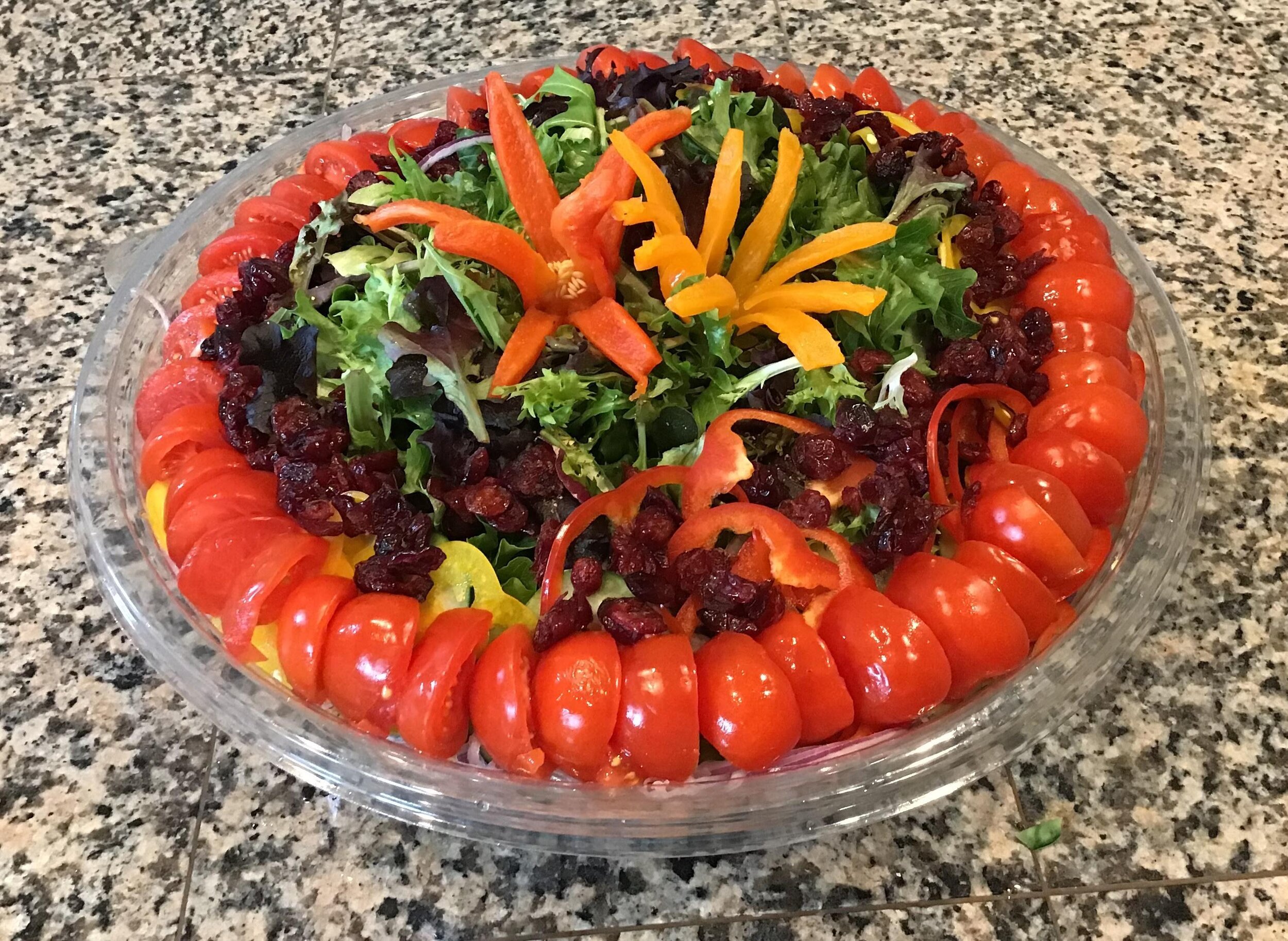

Nana’s Exquisite Confections is proud to be a women-owned bakery that passionately produces up-scale versions of “Yester-Year” desserts. They believe that there is an untapped, limited market for home-style desserts made of premium ingredients, traditional recipes, and a lot of love. If you’re an individual that appreciates the time and preparation that goes into making high-quality desserts from scratch, then Nana’s is the bakery for you!
The fruition of Exquisite Indulgence Desserts, now called Nana’s Exquisite Confections, was not something that happened by chance. In 2006, through the tugging of her heart and soul, Florence Jenkins felt the need to begin using her gifts, talents, and abilities to make a difference for others. As a middle child, she has always been a peacekeeper and always loved sharing and showing love to others. She decided to start a bakery because of her love for cooking which came from growing up baking with her mother and grandmother. She loves to see the warmth and happiness in people’s faces as she presents them with a cake or dessert. What she loves the most, however, is spending time teaching the youth about basic home cooking while talking and coaching them in life to become better people and making sure they know they are loved. Love is a key ingredient in all of her confections.
Learn more about our Empresarios program and other businesses at the Portland Mercado.
Effective September 1st Hacienda CDC offices will be closed on Fridays. Existing clients, partners, and funders have been notified of the upcoming change. read on to learn more about this initiative.
Hacienda CDC is proud to announce a four day, 32-hour workweek pilot for our 56 employees effective September 1st, 2022. This initiative aims to support Hacienda’s team in prioritizing their wellbeing and build sustainable work-life balance as they continue to put the needs of the individuals and families we serve at the forefront. Hacienda remains committed to maintaining high-quality services for its residents and community members and looks forward to the positive benefits offered by this alternative work schedule.
A host of data demonstrates the benefits of a 32-hour work week on staff wellbeing, productivity, creativity, and retention. Hacienda CDC hopes that this change will bring lasting impacts to its existing and dedicated workforce, to the organization, and to the community we serve.
This initiative spearheaded by top leaders at the organization will begin September 1st. In anticipation of this change Hacienda CEO, Ernesto Fonseca remarks, “I am proud to work with a team that is as dedicated and driven as the group we have at Hacienda. Our team takes care of community members, often treating them like family, and now is our opportunity to do the same for our staff. We are excited to pilot a 32-hour work week and we hope this pilot will demonstrate that investing in our team’s wellbeing can bring lasting positive impacts on the work that we do collectively.”
This change follows an unprecedented pandemic, throughout which, employees in all sectors reflected on the importance of work/life balance, family, and security. Hacienda’s pilot is an effort to support existing staff and their wellbeing as they champion the needs of individuals and families across Northwest Oregon.
“We know that this will take some time to adjust, but we are hopeful that the benefits will outweigh the learning curve of implementing this initiative. Our current and prospective clients will continue to be served to our fullest abilities and efforts.” Says Carolina Castañeda del Río, Chief Operations Officer at Hacienda CDC.
With this initiative Hacienda CDC is redefining what work can look like during a time when individuals and organizations have been forced to innovate and adapt to changing tides. Hacienda hopes others in Oregon will take innovative steps to support their team’s wellbeing and be inspired by similar initiatives that have been successfully implemented around the world.










